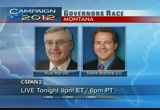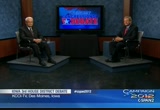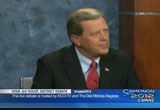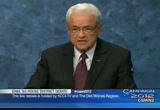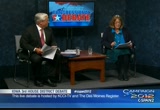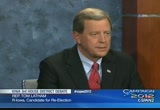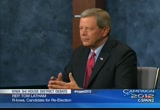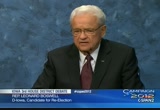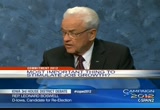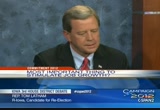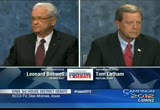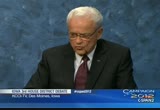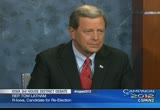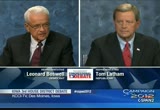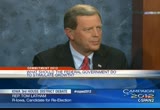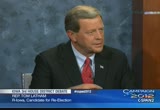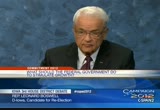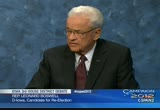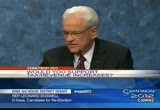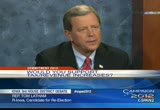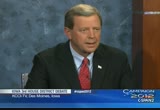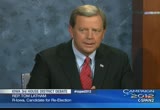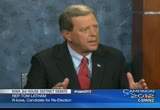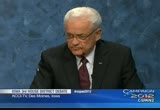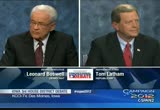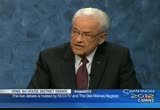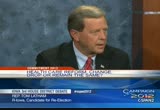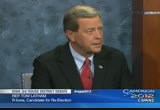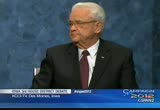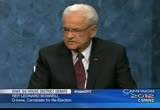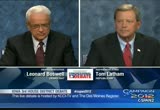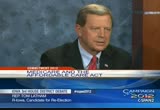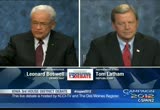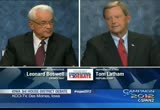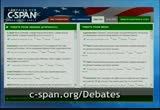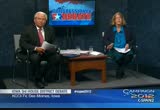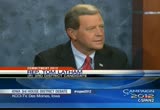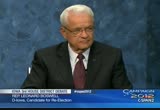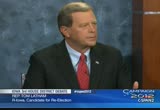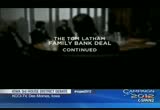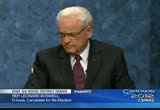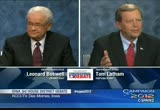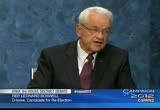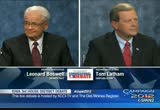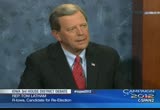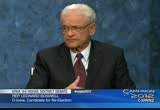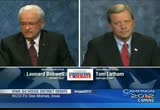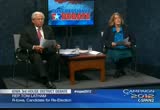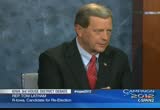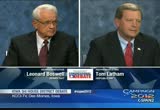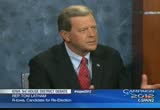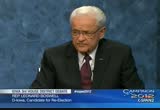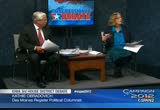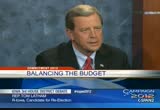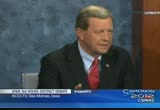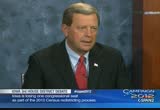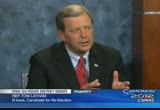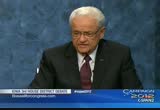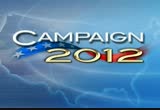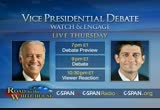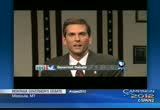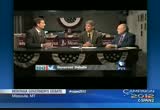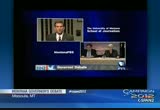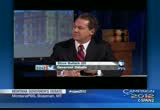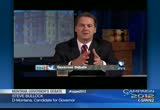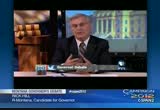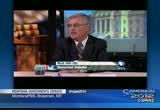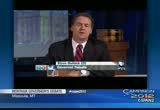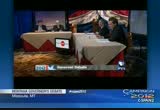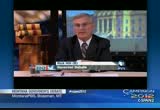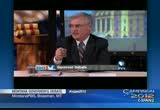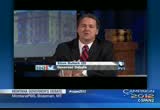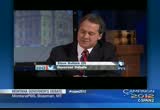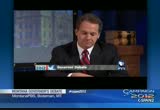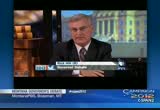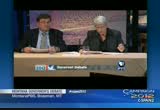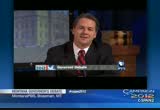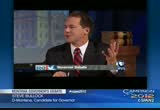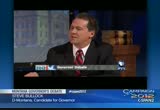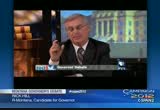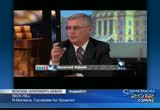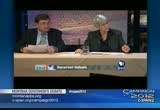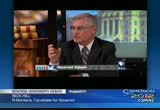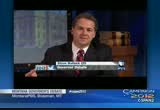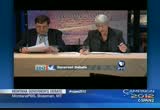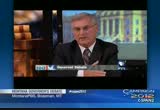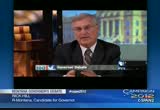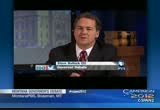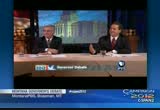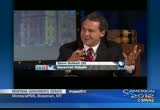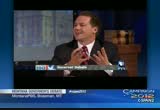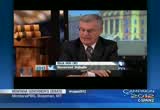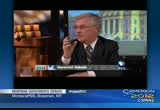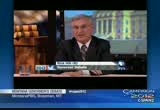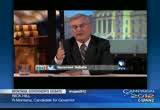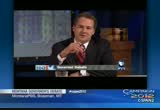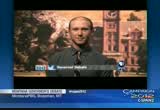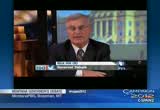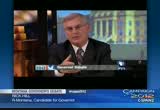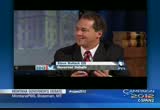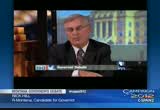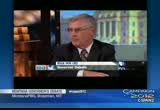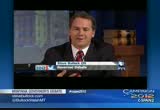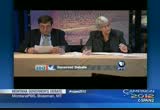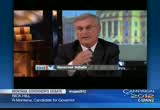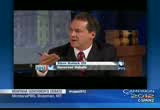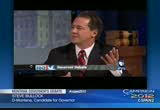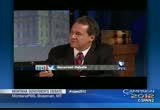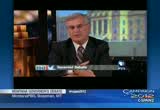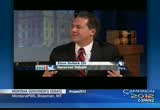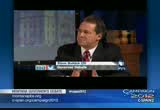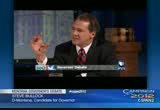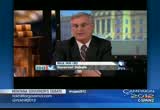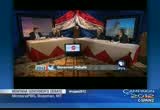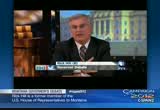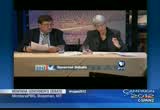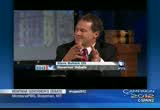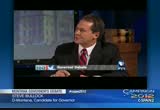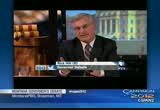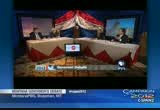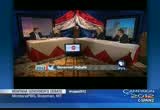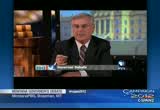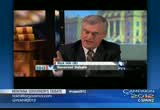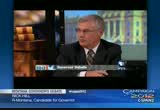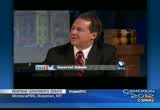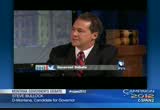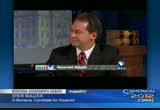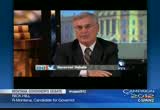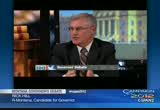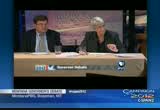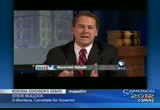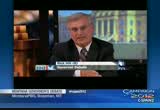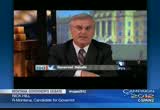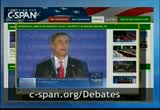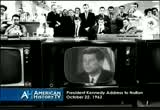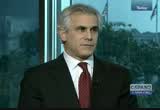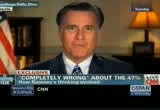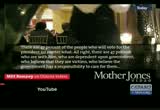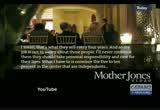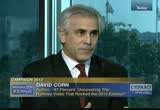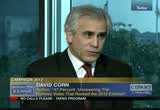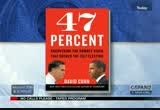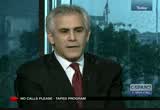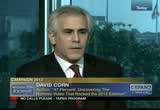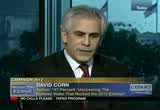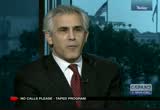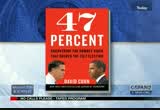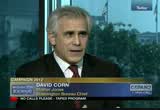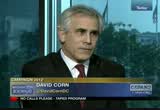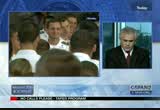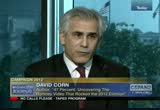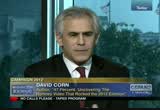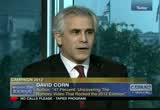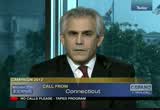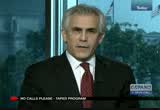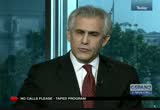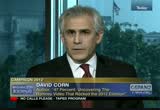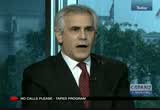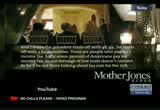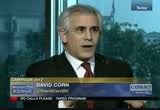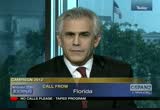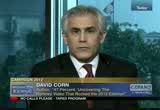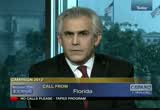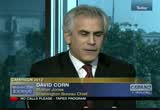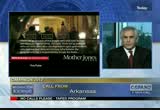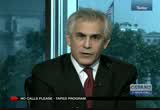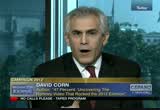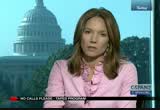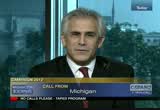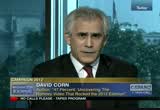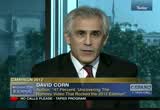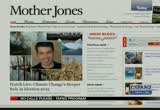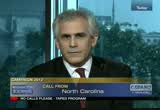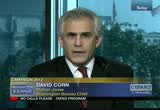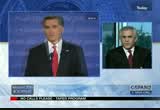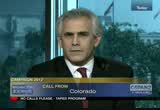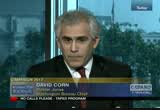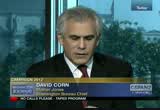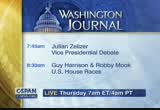tv Tonight From Washington CSPAN2 October 10, 2012 8:00pm-11:00pm EDT
8:00 pm
>> leonard boswell and tom lapan for the race in the third congressional district. now your moderators, if kevin kenny and kathie obradovich. >> moderator: good evening everyone and we welcomed you. i'm kevin kenny and i'm joined by "des moine register"'s political columnist kathie obradovich to question the candidates, republican tom latham and democrats democrat leonard boswell. thank you for your time tonight
8:01 pm
and kcci "des moine register" is cosponsoring this debate. the cbs program survivor can be seen or recorded on channel 8 at 2:07 or on line at cbs.com. >> moderator: a brief explanation of the procedures we will follow tonight. it will be fairly informal but we have a few rules to keep things on track. the only time clock will be for the opening closing statements and the candidates each have one minute and 45 seconds for their closing statements. in between kevin and i will ask questions and read questions from readers and viewers. there are no time limits on the candidates but we are going to encourage people to stay on point to weaken covers many issues as possible. >> moderator: a few minutes ago du quoin -- was won by the boswell cope cashman campaign. congressman latham will begin the opening statements and you have one minute. latham: thank you very much for the chance to be here tonight, for hosting this debate.
8:02 pm
i am tom latham. i am a husband, father, grandfather, small business person, a farmer and that is what my life experience is. everyone understands today that we have real serious problems in this country. the challenges we have our enormous. and i would just ask everyone at home tonight to really think about, if they had more opportunities than what their parents and grandparents had, and if we stay on the track we are onon, are we going to leave those children with more opportunities in the future? and i think that really is the question today. and the way we are going to solve these problems is to finally pull together to work together to listen to each other and to have real solutions. >> moderator: congressman latham thank you very much. congressman boswell. boswell: i want to thank you too
8:03 pm
for having this debate tonight. kcci and "des moine register" thank you very much. much. we have a very challenging time as you know. we have to deal with what is before us and we have to come together. it has been my action as i've i have served as an iowa legislator now in congress going after -- to try to bring people together and simply can't work things out. i think that we can do that and some say i am way over here to the left and some over to the right. i'm in the middle and that is where we have to be if we want to get things done. we can do this. i believe we can i look forward to this discussion tonight and i look forward to continuing to serve you in the third district of iowa. thank you very much. >> moderator: think you congressman in in the end the ft question kathie? matt let's start with congressman latham. a the majority of iowa voters think the countries on the wrong track in the approval of
8:04 pm
congress nationally is averaging about 14% which i think maybe a generous number at the point. why do you think that is and what do you need to change if you are reelected to take sure you are not part of the problem? latham: i have worked hard in congress to work across party lines and i think the reason that people are holding congress in such low esteem today is the very fact that all we hear coming out of washington is a bunch of partisan bickering back-and-forth. no one seems to be listening to each other and no one seems to be working towards the kind of solution to the future problems that we have today. i have known in washington and certainly with your newspaper to be named the most effective member of the iowa delegation in washington of the house delegation and the reason for that is because they do work across party lines. i have chaired an appropriations
8:05 pm
committee, transportation, housing and urban development where we had to work together. my ranking member is a very -- bragged about the fact that he is a liberal member from massachusetts but we have worked together all through the process to share the subcommittee and full committee, three days in debate amendments on the floor the house and we passed the bill with the largest bipartisan vote and we also have the largest percentage of reduction in spending. so we can do it. >> moderator: let me ask you really quickly because they think any member of congress i would ask would say they are working across the island they aisle and they are being more effective, they are being bipartisan. is there anything we can do differently that would help congress work more effectively if you are reelected? latham: well, i would tell my colleagues number one if the problems are too big for one party to solve today. that we have to sit down and
8:06 pm
hopefully after this election is over, people actually want to accomplish something to get our work done to actually do something for the mac and people to get rid of this partisanship. >> moderator: congressman boswell do you think people will want to get things done in the next term more than they have up until now? why do you think congress is so ineffective by voters ashley and an iowa? boswell: i think we have to come to cooperation in the middle and that is what i have tried to do my entire time since my times are. we have got to come together and we can't just be talking, talk, talk and coming up with all kinds of things. i don't know i think we have had maybe 30 votes on dealing with affordable health care and we want to hear it over and over knowing it wasn't going anywhere. no willingness to compromise in the senate and the accusations, the summit won't do anything but let's give them some work where
8:07 pm
we can compromise and come to the middle and we must do that. we have a huge deficit and like i said earlier, a little amnesia how we got there but we are there and we have to deal with this. it's a must do and for the good of the country and same as senator, as tom, excuse me. i didn't mean to relegate you to senator. but i have children and grandchildren and we have got to do some things right for the future of this country. it's a privilege for us, all of us in this country. >> moderator: along those same lines congress and boswell what is the most important things that you think, the most important thing congress can do that would stimulate job growth or lift the overall economy? boswell: right now we are an agriculture stated we are much more. we are certainly in agriculture state and we don't have a farm bill. it comes up every five years and it's very important to iowa and
8:08 pm
all of the crop bearing fire for producing states in the middle was an across the country. we have to have a farm bill and there have been political posturing. the speaker -- mr. latham's best friend i'm told. persuade him and bring them to the floor and let's have a discussion and do whatever amendment is going to do to take it to conference and get it done. >> moderator: congressman latham and congressman boswell the farm bill is the most important thing to stimulate job growth. latham: i have done everything possible to try to bring that tilted the floor. i have spoken out against leadership and i totally disagree with him but when you look kevin ag jobs, getting this economy going and has igoa rand and listening to constituents, small-business people, large business people, it doesn't matter. bavarian certainty that is in the marketplace today whether it's about taxes and what is
8:09 pm
going to happen next year with taxes? the enormous regulatory burden coming out of washington. people don't know how much it's going to cost to have that new employee that they might hire with the health care health care bill or the epa regulations. all of those things that bavarian certainty that's in the marketplace. there was just a survey that came out and said that 67% of small businesses today are not hiring because they don't know what to expect next year. and that is why we have got to have taxes to have some certainty as far as what the regulatory burden is going to be and then we can unleash this economy. we will give people the confidence to hire, to grow their business and to invest and that really is the biggest issue today for small business people certainly and really all businesses. >> moderator: i'm going to stop either congressman and kevin asked to what is the most important and i'm going to ask you what's the worst thing that congress can do right now as it
8:10 pm
tries to drive economic growth? latham: it's a tossup between increased taxes but i really believe the regulatory burden that people have today in a small business that they are fearful of trying to comply with all of these new regulations and what it's going to cost them is probably the number one issue before them today. >> moderator: congressman boswell of, go ahead and respond first and then answer the question, what is the worst thing the federal government can do? boswell: tom talks a lot about it and certainty but a lot happens to create that uncertainty and we need to stop those things and get something done. we need and farm bill and energy credit. yes i think we ought to be clear. gives supported the lose tax breaks and i did not because you know, it seems to me like we have been involved in these
8:11 pm
long, long wars going on and i can imagine what the soldiers feel like. i know what i would feel like coming back from vietnam. now we have to pay for it. that would not be a very good thing and i think that's very bad. >> moderator: how do you respond to that? latham: in the house of representatives we have passed an extension of the current tax loss and i think it's interesting commerce and boswell says that he opposed the bush taxes and he just voted for a budget that extended the bush tax cuts. but, excuse me, please. boswell: the tax is obviously, we need to extend those. you know we have this sequestration which causes rescission and spending at the first of the year. we have passed a reconciliation to take care of that which would be about a $1.2 trillion cut
8:12 pm
with an ax rather than to go through and carved out or save it but that is in place and we have already done this in the house. we need to get this done. it's going to been extremely busy, what they call lame-duck section after the session. >> moderator: i want to give congressman boswell a chance. vase wow that is correct and we have got the working men and women out there of america that depend on being able to meet their requirements, their deaths and debts and their payments and everything else and not to put more pressure on them. it would be a very bad thing. the working class men and women did you get them so that was the reason i did that and that is why we have the discussion. they needed it and those working americans need that assistance
8:13 pm
at this time. >> moderator: along the same lines that make spam things and i would like to know how far in your opinion, how far the government should go when it comes to taking measures to stimulate the economy. perhaps more specifically is there another stimulus out there that you might approve in the infrastructure and individual industry as such? are tax incentives like stimulate the will to business or individuals a good thing and let me give congressman latham a chance. latham: i would never support another $831 billion stimulus package that was a failure. the basis was that unemployment would never get to 8%. it was 43 minutes of over 8%. afterwards the money was not focused towards job creation. it was basically intergovernmental transfers. it didn't put enough money into what we should have invested in and that is infrastructure. roads and bridges and things
8:14 pm
like that. there was only 3.6% of the whole stimulus bill that actually went to the roads and bridges but again kevin, what we really need and if you talk to any small business person out there, certainty as far as their taxes next year. they don't know what their marginal tax rates are going to be. capital gains tax rates and of course dividends. what the death tax is going to be after the first of the year, alternative minimum tax. they don't know in so how can you invest into an economy with all that uncertainty? >> moderator: wouldwould you support a similar sort of stimulus if it was more infrastructure? if we were going to build more roads and bridges like the 42,000 miles up interstate road started back in the 1950's? latham -- latham: those are the things that will create jobs. those are not going to be jobs that will be shipped off to china. those at the very important and
8:15 pm
as chairman is the transportation and urban development subcommittee on appropriations, i deal with them all the time and our problem as far as the highway trust fund and getting as much money into it, we would love to see that much greater as far as investment, but while the authorization is a little over $39 billion, revenues are only $27 billion that is the problem today. we have to find a revenue source so that we can invest in infrastructure. >> moderator: congressman boswell i want to get a chance to talk on what sorts of stimuli you might endorse or approve? boswell: guess we have to do things with their roads and bridges, no question we have to do that and i heard you talking about the shortage but i didn't hear you talk about the revenues. we don't want a situation like we had in minnesota a couple of years ago. the stimulus, has it worked well? you drive across 80 and etienne up and down 35 and see the
8:16 pm
roadwork in the bridges being repaired. that's a very good thing and something we have to do. the stimulus, when you think about the great recession that we got led into and many have already said that waste at the convention that never in our history as the president had to take anything on like this but when you think about teachers and our future with education and you think about law enforcement and safety on the streets. we think about firefighters and things that we have had to do. we have not responded to doubt where would we be and what would have happened if we hadn't have done the things that would get the environment going again, the manufacturing of automobiles and general motors? >> moderator: you mentioned roads and bridges but what would you favor and how would you pay for his? boswell well i think we are going to have to raise the tax. i think we must do that and it will be indexed inflation but we have talked about that before. that is not new information for
8:17 pm
you. we talked about in the transportation infrastructure committee sometime ago. it was made between mr. young and mr. oberstar who talked to president bush at the time and he said he would veto it so that did not happen. we have got to do it. >> moderator: congressman boswell, believe you support president obama's stand that would raise taxes on people who make over $250,000 a year, is that correct? boswell: that's correct. >> moderator: talking about creating jobs are you worried that will actually slow the economy and hurt job creation? boswell: a lot of people say that when we look at this trickle down theory. i don't see where that has been the historical success when we think of the years we have talked about it but if you go out there and do things or make the working people, this is a financial center here. we are second only to hartford
8:18 pm
and we think about that and all the working men and women any think about the people in the factories which is true but what about all these cubicles we have downtown where people show up for work. they are the ones that get the opportunity to go out and buy appliances and by cars and upgrade their homes. they have to have a fair shake and so therefore i didn't want to put them in a more difficult situation as would have been if we had not extended and we cannot keep doing that. >> moderator: mr. latham what evidence is there that raising taxes on the top wage earners would actually decrease job creation? latham: that is a great question and the national federation of independent business just did a study. you have got to remember most of these people, the high earners, our small business people that would get hit with a tax
8:19 pm
increase and what their estimate was, study done by ernst & young, said it would cost about 710,000 jobs in the united states if in fact those taxes were to go up. i mean i agree with president obama two years ago when he said that when you are in difficult economic times, it's the worst time to raise taxes on anyone. especially the people that you are expecting to hire to be the job creators. these are people that are earning money and these are people who are investing. talk about taxing the rich, the warren buffett's those folks aren't going to be touched a bit by this because these are taxes on earned income, not passive income. >> moderator: are there any taxes you would consider increasing? congressman boswell mentioned the gas tax. latham: i don't think in the middle of a difficult time when
8:20 pm
people are struggling to find jobs and small businesses are having a real difficulty trying to create jobs and invest in this economy, i think it's the very a very wrong time to raise taxes on anyone at this point. boswell: you have signed the far right commitment that you would not raise any taxes and i don't know why you would do that but you have. i didn't expect you to give a different answer than what you did if i may, and -- latham: congressman boswell said he wanted to raise taxes on small businesses and the earners out there. but it doesn't affect the wealthy. >> moderator: people earning more than $250,000. latham: there is a big difference between the warren buffett's who take their money and the capitol gains and people who are out there working.
8:21 pm
and that is a real difference. if you don't understand -- i am a small businessman and i came out of that background. you can have a good year and have two or three bad years and you get hammered in that one good year and people think in the small-business people take that money and go to hawaii or something. they be put in the business. the invested and hired more people. that is how you create jobs. boswell: i am filing agreeing on something somebody said that. >> moderator: following up with congress led -- congressman latham, one point you said this is the worst time to raise taxes on job creators of what would be a good time to do that? if it was 3.5% would you favor increasing those taxes on the people make over $250,000? latham: what we need to do, in the house the current tax extended for one year to give us an opportunity for the overall tax reform and what we are
8:22 pm
talking about there is to lower rates on everyone and have maybe a 25 or 10% rate but you also started out with a clean sheet of paper that is far as the loopholes that are in the tax code, generally two years ago made $14.7 billion did not pay one dime in tax. that is wrong. we have to get rid of the loopholes so we can in fact have more revenue and if there is a certainty in the tax code, the best thing to do for revenue for the federal government is to have a vibrant, growing economy where people are working and people are investing where they are paying into the social security trust fund and the medicare trust fund. they are paying taxes into the government. that is how you grow this economy. >> moderator: to congressman boswell are there exemptions and deductions that you would want to see either reduced or eliminated to help flatten that tax code loophole? boswell: we have to do do
8:23 pm
perform. i agree on that, we need to do that. there are so many loopholes and we see things with lennox and some of those things and that has been an impact on our economy. it's just unbelievable. i went through the maytag situation not too long ago and i was a witness to that. we all know what happened with lake mills and happened in marshalltown and places with these other companies have been given a tax benefit and taken their jobs overseas. we can't keep doing those kinds of things. it's got to stop. >> moderator: gentlemen let me turn your attention to health care for just a moment although there is certainly a financial interest there. health care reform has been a source of enormous amounts of controversy philosophically and financially over the past couple of years so let you ask you an begin with congressman boswell, should health care reform as we have it now be altered, changed or remained the same?
8:24 pm
latham: the affordable health care after obamacare seems like it is actually working and people across iowa as they talk to me about it, for parts of it that have really been important they are very appreciative. they are glad that this president didn't actually kick the can down the road. let's take this on. is getting out of hand and so much of it is being paid by the emergency rooms. let's include more people and be able to do that so the preexisting condition situation, who wants to go back on that? >> moderator: keep it like it is or change his? boswell: there can be changes. for example the hospital associations, iowa health and dock year's, they were starting to get some feedback but part of feedback is they are not giving member care and they are happy about it and they are sharing that. it is actually creating jobs because they have a bigger pool.
8:25 pm
>> moderator: what about change his? boswell: those changes will have to come want to get to that point but right now we are in the infant stage. you can't have a cap and you say will you stop now and cancel your policy because you have gotten sick and you're in the hospital or you can have your children on until they are 26 because they don't have a job. there are a number of good things that are actually working and this is good. >> moderator: just to make sure, it doesn't sound like you want to change anything. boswell: i am very willing to listen to their feedback and make whatever tweets we would make. i want to compromise on it but i think we have all been a very good thing. >> moderator: congressman latham, what do you like, want to change or get word of? latham: there are certain things that everyone agrees on. we are not controversial. that would be people with preexisting conditions, taking
8:26 pm
on the cap on catastrophic losses for folks, keeping young people on the family insurance policy if the family wanted them to stay in the policy. those things are not controversial and would be included in any kind of reform. but, we need to replace the current health health health cal because it's not going to work. i mean, it's $716 billion coming out of medicare that people have paid into all of their lives. if i may continue. >> moderator: we have a question coming up on that. latham: a separate new entitlement that has nothing to do with medicare and medicare trustees themselves just came out with a report that said that 16% of the hospitals would no longer take medicare patients in this decade and the next decade
8:27 pm
25% of the hospitals would no longer take medicaid patients because of these draconian cuts that are going to come to the hospitals, to the nursing homes, to the home health care providers, the physical therapists therapist and the doctors. i mean it's not going to -- their doctors right now that are not taking medicare patients. not at this point but that is what the medicare trustees, these are the people who run medicare, are saying. >> moderator: well, let me ask you quickly about medicare. can i ask you? boswell: mr. latham voted twice on the ryan budget which takes money out. >> moderator: let me ask you about medicare. you have far to exchange attacks on medicare in your ads and they have been some of the same attacks we have seen between mr. romney and president obama and the fact checkers actually have been having a field day
8:28 pm
with the charges on both sides so i would like it if we could try to sort out the facts. first of all we have already heard from congressman latham about the money, the affordable care act takes savings and cuts to providers through medicare. you voted for that. wayzata good idea of? boswell: the medicare adjustment extends the life from medicare and gives us time to work on it which i certainly think we need to do and nobody is being denied the care. when they started it up and the insurance companies those that were ministering made big profits and we will set at different times we are to bring that back and say that and we did that with the affordable care at. we did that and it extends the life 10 years. if you turn it over like he is purporting to do, 2016 and it's gone so we are back to getting those 40 million people who don't have insurance and we have people who don't have coverage and the children aren't covered
8:29 pm
and nobody wants to go back there. that is what will happen if we turn it over. you have a proposal that you would like% and you have a bill, is that correct? latham: yes. boswell: it's been out there for almost two years and i looked it up and i don't see a single co-sponsor on it i wonder how long you -- how hard you are working on that. latham: there are a lot of different bills out there. boswell: i am talking about yours. after a couple of years it is still sitting there in the committee with no co-sponsors and it seems to me there is a little weakness they are and what you believe in. latham: no there is not all. boswell: who are the co-sponsors? latham: did you have a bill congressman boswell? boswell: the affordable care act. it needs some working and it needs some tweaking and it's a big item.
8:30 pm
i don't know what that would have done to our economy. the affordable care act is workable and talking with iowa health and mercy. go out to grenell regional and talk to -- >> moderator: you know i wanted to redirect this but you voted twice for the paul ryan budget which includes a plan for medicare, and that plan is being criticized by democrats as being, the beginning of the end of medicare. why are they wrong about that or or -- [inaudible] latham: that was the fact checkers political ally of the year last year. the fact of the matter is, we saved medicare for the future. you can't take $716 billion out of something and expect that to save it. what the plan will do is to
8:31 pm
actually keep that money and medicare so that those doctors and the affordable care act that congressman boswell brags about do you know what's going to happen to doctors this year? they are going to have a 27% cut to their reimbursement. you are not going to have doctors taking medicare patients after the first of the year. the affordable care act did nothing on doc year's. what we need to do is he a system that preserves medicare for his the long run. and that is what the budget is about. boswell: to preserve it and take the waste out of it, we have done that and it didn't happen with the affordable care act. it has happened but -- what what are you talking about as he voted twice on the ryan budget that does the same thing and it moved us to a voucher system. [inaudible]
8:32 pm
boswell: i don't think you or you or i could go out there -- and get through this cost of trying to find insurance to cover it and the insurance -- current would increase it by 60. we can do better than that. moderate. >> moderator: go ahead. latham: congressman boswell voted for what he calls vouchers back in 2003 and this was a house-passed version of the prescription drug plan that he voted for that has the same kind of premium support and that he now claims are vouchers and it went over to the senate, to conference and that was taken out and then he voted against it so it must have been good enough for him to change his vote at that time because he was for the vouchers that he says and now -- >> moderator: what is your response? boswell: are you talking about
8:33 pm
the pharmaceuticals that created the big doughnut hole that you voted for? i didn't vote for that all-night session when the leaders came to the floor and twisted arms and god changes. latham: you voted for the house version. boswell: i did not. >> moderator: you disagree on that particular point and well we have a point we are going going to take a break. i debate with tom latham and leonard boswell continues.
8:34 pm
>> our coverage continues through the november 6 elections. >> moderator: the d.c. political newspaper roll call moved into the tossup category from first calling leaning to the republican side and with that designation came more and more tv ads. >> moderator: tonight we will play to campaign ads and these are not third-party ads or paid for by packs. they come from the candidates own campaigns themselves.
8:35 pm
after the commercials we will talk about them. first this ad paid for by the latham campaign. latham: i am tom latham and i approve this message. >> in the last four years 11,000 iowans have lost their homes. thousands more have lost jobs. congressman leonard boswell reported the government staff with more than a half million dollars in bonuses, bonuses as big as $14,000 paid for by taxpayers to didn't have money to spare. iowan struggle while leonard vaux will spend our money on big bonuses the washington way. >> moderator: congressman latham tell us about that. latham: congressman boswell has given his death since the economic turn down, in fact in 2008 when people were struggling for jobs, losing their homes, congressman boswell apparently found it appropriate to spend $500,000 giving his staff.mrs..
8:36 pm
and that really is what washington thinks. to think that maybe no one is going to notice or whatever but the fact is people are hurting here. they are trying to work very very hard to try to save their jobs or to find a good job and we are giving these kinds of taxpayer bonuses just a think is totally inappropriate. >> moderator: we will give congressman boswell a chance to respond. boswell: how disingenuous. we have small staff and they work very hard and we appreciate them. we have to have that to make a constituent services and we have 34,000 more people who serve in our district now but with this issue, we looked it up and my office account is given back more to the treasury than what his heads and on the average, the people who work in our offices, he is paying $6000 a year more.
8:37 pm
how can he be serious about what you are saying when you are paying more and trimming back less? i think you probably ought to tell it you how sorry you are for doing that. latham: the fact of matter is congress in last 16 years all the time spent in congress he has paid his staff $1.5 million more than what my staff has and you know the "des moines register." excuse me. part of the problem we have in washington is people won't listen. and this is the washington think right here, that you can just talk over somebody. you don't have to listen to anybody. it's my way or the highway and that is what happened when nancy pelosi and leonard oswald were in charge of the house of representatives. the cap-and-trade bills that he voted for, the stimulus, the health care bill brought to the floor in the middle of the
8:38 pm
night, no amendments, no opportunity for debate and chanted through and that is a problem. >> moderator: the topic is that particular ad. congressman, have you paid $500,000 depending on which ad you believe, they're two different ones out there one from a congressional committee and one from congressman latham. vase wow i have given bonuses at the end of year,, incentives for the good work they have done. he has done thousands himself and if you look at the overall picture of what on average he pays $6000 more per year annually per employee more than i have so this is very disingenuous. >> moderator: let's move on if we make to another commercial and we will have closing statements and opportunities for everyone to rebut various things but right now let's listen to congressman boswell ad. boswell: i'm leonard rosalynn i approve this message. >> the tom latham family bank
8:39 pm
deal continued. first latham's family bank gets $2.4 million from the bank to allow. one reason tom layson is nearly six time richer since he came to congress 18 years ago but now we have learned that the latham family bank is one of three i would think that still has not paid off its debt to the taxpayers. nice. tom latham gets rich and taxpayers are still paying the price. >> moderator: congressman boswell -- tell us why you made this commercial. boswell: using the t.a.r.p. is not illegal at all. >> moderator: i was just explaining the act in them. boswell: appreciate you doing that but anyway that is the purpose and you know it's okay for him to use that and according to the ceo report they did it and it worked for them but for him to preaching carry on about the bad, the t.a.r.p.
8:40 pm
and then his biggest investment, his own bank with his family, his brothers to use it and then preach against it and using it and then not paying it back to something that seems very disingenuous to me and i just felt that was not a good thing to do. the people ought to be aware of that. >> moderator: congressman latham is this ad fair? latham: no, and again anyone who is looking at it independently has said it is false and misleading, something that the "des moines register" as you know said congressman boswell was to maine and -- maintain any credibility in this race that he should take that ad off of the air. well he voted for it to start with. boswell: and he did not.
8:41 pm
latham: would you allowed me to continue? he voted for it and you know by his own standard he talks about you know, six times more income or wealth. he has five times more and the same standards that he used that this is really about dean on his. about someone who tries to make up an issue and i would just ask congressman boswell, one is the last time you ran a positive ad that is not personal? boswell: thank you for that. i appreciate that question. may i answer that question? i decide to buy if i move into this campaign i would do a little history check. when i started out there was a guy named macafee that was positive and upbeat and someone that i respected very much and i checked to see what tom layson was done. i looked at maguire and john norris and it's all the negative and now in this campaign that we are and, maybe close to 3 million live paid negative so
8:42 pm
i'm not going to take this laying lying down. it's not my nature and i'm not going to do that. you should know that. that. you have been negative throughout your career in what you have done and so here is the situation where it's so disingenuous to use something and then preach against it and for iowans, if you think iowans don't realize where your major investment is? that i don't know where it is her kevin doesn't ortous or kathie or anybody else? of course we do. latham: of course we know where it is but i don't have any influence in the fact of the matter is -- boswell: not true, not true. latham: on what basis? >> moderator: congressman latham answered. latham: everyone who has independently looked at it says he loses all credibility in this race by continuing to run this ad does like his mode of
8:43 pm
operation and i have been running positive ads all yearlong about what i believe about the future. and you notice he didn't answer the question about when was the last time he ran a positive ad because he can't remember. it goes way back. how many cycles and i think that's very unfortunate because they this should be a discussion on this election. two incumbents with voting records to compare where they stand on the issues but instead what he talks about our personal attacks on me. >> moderator: let's if we can move along to some of those issues. when they solicited questions, reader questions as far as kcci's questions were concerned, a number of them dealt with term limits believe it or not in congressman boswell, you have had eight terms and congressman latham, nine terms end we have received questions about how you feel about term ed todd -- term
8:44 pm
limits. i have four or five people here so let me ask you and perhaps you can expand beyond that, you talked about the election that. let's talk about campaign form and whatnot but first let's address term limits for congressman. should the member of a congressman have term limits? congressman latham? latham: if wiki get it passed and we tried it back in 1995 and we had several boats and what happened, the different states came up with their own versions of term limits and then they had on the ballot saying if you didn't vote exactly for whatever the state states term limit was, you have got the scarlet letter on your ballot. it's going to be very difficult. for a state like iowa, well please want to turnover people, it also is very difficult. we only have four
8:45 pm
representatives in the house today and when you look at what florida, california, new york, if they could get together basically put all the chairman and the ranking members from the big states so we would have no way of having a chairman of the appropriations committee from iowa if in fact term limits were -- boswell: the way to set up today -- >> moderator: congressman boswell? boswell: that is not a bad idea but every two years we have an election so it never goes away. the people get to decide but it seems to me like we agree on something and i would agree with you tom, the largest states would run everything if that were the case so we need to think about this very carefully. to do something like that, i actually have drafted up a bill for a four-year term and thought what would be the objection to his?
8:46 pm
the objection would probably be the senators. if tom or i -- [inaudible] my answer is, when i talk to people about it, if the person did challenge one of the senators in the middle of it, they would also have a constitutional amendment and they would have to have a special election so wouldn't change that future. there wouldn't be any co-sponsors because they would feel would be self-serving. >> moderator: even though we don't have a clock running i will ask you to voluntarily shorten answers a little bit and i would like to turn your attention to agriculture. the federal government is currently subsidizing crop insurance when yields are down and it doesn't offer that kind of insurance to other industries. paul buehler of newton is a reader and says shouldn't farmers face the same risks as other businesses? boswell: we all have a vested
8:47 pm
interest in agriculture so i think when you sit down and spend times with their friends in los angeles and new york and you say you get something for this investment. you get the safest most plentiful and it doesn't seem like up at the least expensive food in the world and this is a big item that is very important. >> moderator: to keep subsidizing crop insurance? and congressman latham? latham: farmers today understand the national debt and they are willing to contribute to reduce that spending in wishing 10. they voluntarily said let's do away with direct payments and that dramatically change the counter-cyclical programs that have been almost generations now. but the one thing that they need is a way of managing their risks on the farm and whether that be through crop insurance, both for the crop itself and for price, for revenue, that is where we have got to put our focus.
8:48 pm
>> moderator: crop insurance in place? latham: we are contributing a great deal towards deficit reduction act and if in fact we can have that assurance that -- >> moderator: does agriculture have insurance as grain farmers do in other words livestock farmers who complain they have to pay so much money for corn to feed their animals and they are not getting as much help and they have to sell their animals. boswell: again we need the farm bill and i think we would agree on that completely. we need that farm bill and i would hope the speaker, your good friend, would say okay i'm going to set up step up to the plate and bring that forward. latham: the problem with the livestock, the last farm bill was passed because it went slightly over the allocation. the livestock asked for provisions for four years of the five-year bill and so the year it was needed there was no provision there so we passed it
8:49 pm
in the house retroactively to put that back in place so that those livestock producers to have coverage this year in a disaster. >> moderator: very briefly -- have asked to have the fuel standards suspended temporarily so that they could have lower prices for grain. just maybe quickly yes or no, would that do any good? boswell: yes or no but i support alternative fuels and i think we have the capacity to continue to do that even though this is a drought year. we still remain in the top 10 of the production years i believe in what we are doing in corn so i don't want to take away from our ability to get out of opec. >> moderator: would you keep that were noble fuel standard in place regardless? latham: we have a very high corn price and fortunately the prices have moderated so i think while they are still high certainly i
8:50 pm
don't think that the epa is going to change the standards. >> moderator: we have about six minutes left. before we get your closing statements we would like to move on. we touched on the economy but closely related to that is the federal deficit or the federal deficit a major problem on the minds of many viewers. went here want to know what three specific budget cuts he would propose and support? latham: i think in my appropriations bill, it's a good indication of the transportation hud and we have the largest percentage cut meaning the appropriation bill this year, little over $4 billion bus going through individual programs. kevin, i think are importantly long term what we need to do and i have a bill called the less government acts. what this would do would be to apply proven private-sector management tools to the federal government for efficiency. you can reduce about 25% of the
8:51 pm
cost of administering all of these programs to have the administration much more efficient and have the services come out there and this would go much more to cutting the deficit and the national debt than cutting individual programs. there is no incentive for efficiency in the federal government. >> moderator: congressman boswell? boswell: i i am a long-time soldier and i believe in strong defense, actually do but we are paying more for a defense than all the countries in the world so something is out of whack here. we ought to address that and we have a well-respected secretary of defense who recommended that a few years ago, secretary gates. i am on the eisenhower commission and president eisenhower gave us a little instruction in a couple of years ago about the military-industrial complex and it needs to be brought in.
8:52 pm
so i think we are out of whack. we have got to have strong defense, absolutely. that would be a good place to start. latham: i just want to say the defense department is on schedule for $437 billion of reductions over the next 10 years right now. admiral mullen, the former chairman of the joint chiefs of staff, said that the number one national security issue for this country is our debts. it is not some other country. we are going to destroy this country from the inside and that is the biggest concern. >> moderator: my next question is about the debt. the federal krugman and he talked about this already is facing a fiscal cliff come january where these automatic cuts to the military and entitlements would take place as a result of the deal to raise the debt ceiling. so will you vote in the
8:53 pm
lame-duck session to push that back and give yourselves more time to sort out a more reasonable cut? boswell: we probably have to do that but as a reminder kathie last december the special committee that the sequestered thing came in and put the hammer on, that was not a good idea. it didn't look after education and number of things so it's got to be dealt with. i'm worried about that. we need the farm bill and the wind energy credits and the things that will improve our economy. >> moderator: would you vote to push that fiscal cliff backed? latham: we have are devoted in the house of representatives and to be clear i voted against the debt ceiling. to put this committee in place in the sequestration, but we did vote and have passed in the house of representatives a reconciliation to put off the
8:54 pm
sequestration. >> moderator: gentlemen if we could get to policy questions. we are almost out of time but let me ask you what you feel the biggest overseas threat is facing america since we are talking to a certain extent about national security. congressman latham? latham: the first thing i think is iran building in the rear weapon. is a very -- the government itself is not an international player. they are not people that anyone can trust or rely on. they have publicly said that they want to destroy israel, that they want to destroy the united states and well, number one we have to back up israel because they have the best intelligence as to what's going on in iran as far as nuclear weapons and what stage they are at and if in fact they are to the point of developing that capability.
8:55 pm
they will use it. that is the difference and that is why we have got to be supportive of israel to make sure they never have that capability. >> moderator: congressman boswell same question. boswell: at least we don't have bin laden to deal with because of president obama. that was a big threat but you know it's something and these sanctions seem to be working. the nations of the world are saying we can't let this go one. they are surely starting to feel the impact of that but israel is a concern of mine and has been and will continue to be so. >> moderator: one last question about immigration. we had a reader question from des moines. what are your views on immigration reform and how would you give members of congress to move forward on this much-needed issue and citizenship for immigrants? latham: first of all you were not going to have an honest discussion and till we actually
8:56 pm
secure the borders. we just lost another border patrol agent this last week. apparently it was friendly fire but it was triggered by an intrusion from people coming across the border. and what these people are bringing in are the drugs and violence into the united states so we have got to secure the border. we have to enforce the laws as far as employers who knowingly hire these folks. >> moderator: we are short on time. congressman boswell. boswell: i believe we both voted to put the necessary troops down there and we have to do that for one thing, but the borders is really it. if they don't find a job they are not going to come so we do have to reinforce that so we could have downed that. >> moderator: gentlemen we have to move on to closing statements and for his closing statement and we turn first to congressman latham. latham: thank you first for the opportunity to have this discussion tonight and i will just go back to what i said at the beginning.
8:57 pm
we are in a ver difficult time. we have enormous deficits, the national debt. we have got to start, and i want to be part of this, to put people ahead of politics, to put progress ahead of the partisanship that is going on in wishing 10. we have real problems out there and i look at my 10-month-old grandson and the fact that he is $50,000 in debt as a share of national debt, it's not sustainable and i would ask people, i'm working very hard for them and i will be effective and i would ask for their vote in this election. >> moderator: congressman boswell, 45 seconds. boswell: i want to thank you to matt for having this discussion and to remind you that i am supportive of simpson-bowles to try to get this template to get things going bipartisan lands
8:58 pm
sit down and work it out and put it out there in the daylight and let people see what we are doing and move forward and get something done. we can do that. i'm very positive on the country. maybe i'm just an eternal optimist but we can do this. coming together and everybody doing their part and i'm willing to do it and willing to compromise and willing to work with others and i've demonstrated that i will continue to do this and i is is asked for a consideration as we go to this election. >> moderator: gentlemen are time is up with want to thank our -- tom latham and leonard boswell and thank you to the register for cosponsoring along with kcci. thank you for your viewership and most importantly, don't forget to vote.
9:00 pm
>> now former congressman rick hill debates steve bullock. the winner will replace. >> montana public radio, yellowstone public radio and the university of montana's journalism% debate night. the race for governor. productions for debate night was provided by the greater montana foundation, encouraging communication on issues, trends and values of importance to
9:01 pm
montana and by viewers like you who are friends of montana pbs. thank you. >> moderator: good evening and welcome to our coverage on debate night gave us like to welcome viewers across the country on c-span, those online at montana public media clusters in the austin public public radio. and just it, i'll menace both get you you two are missoula studio. republican rick hill and democrat steve bullock based on independent polling, the libertarian candidate did not reach 5% and is not included. again tonight we went postdebate analysis, including a research team from university of montana school of journalism checking information for us throughout the debate. also with sr analyst and back once again its republic and, former montana secretary of state, new poll out today from msu buildings. steve bullock 38% and amazingly,
9:02 pm
20% undecided and nice. what do you think needs to happen tonight is that undecided number? >> well, to begin with, i think there was another poll taken a week or so before this one was. abusively understand what the timeline was. it showed bolick ahead by one point. i think what it means is this is just close and the reason we get 20% undecided is because the gubernatorial race, even though it's a high visibility races below the presidential race in the u.s. senate race in terms of advertising and public attention. >> that's probably too when i saw montana prides itself on being an independent state. republican governorships so maybe that's what happens. but obviously room on this survey should help to decide. >> unlike other debates we've had, this is the fourth boy, so they went through the televised
9:03 pm
debate. now let's get the evening started. the format is simple. there is no moderator. journalists will ask a direct question. two minutes for a response in one minutes for rebuttal. there will be enough or 294 follow-up. each candidate will receive 90 seconds for a closing statement. are journalists of the night, chuck johnson for the newspaper and news director for montana public radio. leicester head over to them and will start the qustioning. >> welcome everyone and good evening, mr. bullock and mr. hill. showing 27% undecided in this race, mr. bullock, tell them why you would make a better governor than mr. hill. bullock: sally, i would make a better governor because both my values come my vision experience. we been able to solve some real difficult problems and challenges. we brought people together and
9:04 pm
we work collaboratively across party lines and across county lines. to deal with the issues like repeat john driving, prescription drug abuse, keeping kids safe. it's also where i want on the state. i was raised here, educated in honor schools. kids go to the same school as we went to ice caves, but my wife lisa went to. i want to look at where montana can go not just in 2013, but as we go forward. i think there's opportunity to diversify our resources in a mansion everything else can do and everything else we can become. there's great possibility for making sure we do that much better. when businesses not to come to a state or when they're building a business, you look for both quality public schools and a trained workforce. and montana, our economy is
9:05 pm
going to be as big as we wanted to be. i want to her to make sure the opportunities are available from montanans. >> mr. hill, where we shoot better a better governor? hill: i've sugar and 84,000 miles. people say to me we need more jobs in better paying jobs and i agree with that. i doesn't matter fact, montana's trailing the job creation and montana as 49th. i've got a broad experience in the public sector and private sector. as a result of that, i developed the hostility we haven't montana tourist business. the u.s. chamber censor legal climate is 45th in the nation. most business groups say that our regulatory climate is one of the worst in the country. so we developed a plan to tackle those two issues, to do so in a
9:06 pm
way that allows us to preserve the big sky country will still take advantage of the treasure state, but to attract investment that will create better paying jobs. in addition, we want to bring better management and budgeting, which is like strategic planning for government. the third area is many to do better job than public education. today, 20% are graduate from high school. 30% a come to this university remedial reading or math. we have to do better for when our kids prepare for the 20th century. >> mr. hill, earlier in the campaign you said you were in support of a sales tax and montana to replace the property or income tax. now you say you are posted sales tax. which is it and why? >> good question. there has been some confusion about that. i never suggested a sales tax will be part of the hill administration it will be part
9:07 pm
of an agenda for this administration. what i have said is i think maybe a letter of the sales tax is that of other taxes. i want to make this clear that we don't need a sales tax and montana. montana's dome on a sales tax and i'm not going to support a sales tax. if they put on my desk i'm also in the back to them. if you want to sales tax they have to put it on the ballot. i do have a plan for tax reform and montana that would use oil and gas revenues. $200 million that would be devoted to dividing property tax relief. the result is that will be every small business in montana will receive a substantial. >> mr. bolick, sales tax. bullock: if a sales tax on sandusky will veto it. the congress has said repeatedly actually she would favor a
9:08 pm
replacement tax. he also points to property tax rates inside, idaho or wyoming so much better off given the fact of their property tax rates. by and large, even conservative groups say we have each best taxes for businesses in the nation. so the other safety looks that have sales tax. i think we can do great things for montana. we propose to give them a business tax cut. there would be 11,000 businesses across the state. a $400 for a phone that owns a home in montana. so we will make sure to help up main street is as well as to certain another places like that. >> the u.s. supreme court citizens united decision of the two judges and montana striking
9:09 pm
on several montana's campaign finance laws, essentially opening the floodgates of spending in the state and national races. one lot was reinstated by the ninth circuit. many people including your opponents believe citizens united and a follow corrupt the election process. others think it's an extension of free speech. was that a good decision? >> when i was in congress, six freshmen democrats got together to try to do with soft money, which was the version in those days ago we have with unlimited expenditures. we made a proposal to limit soft money, lurching and contribution and large individual contributors contributions to the parties. that is about the only part -- democratic campaign finance reform that is really stuck through this process. so i worked on this issue. i believe we can have contribution limits in montana
9:10 pm
for everybody plays by the same roles, where there's full transparency and it can be done in a way that can meet the constitutional requirements. and tonight in the past and i'm confident we can do it again. i have been a victim of unlimited outside groups spending, running some of the most foul offensive ads anyone has ever seen. i know what it's like as a candidate to not be able to raise money to compete with that kind of outside expenditure. but when it is a balance system. we need transparency so that we know who's doing what. the supreme court has said you can limit contributions. you can't limit spending. it has to be created in terms of how you manage that. but i think we can do it in montana. >> the question was do you support or was that a bad decision? bullock: i don't think it is a correct decision to offer expenditures of money on anyone's behalf.
9:11 pm
the problem that you have in washington is that every party, both parties protect contributors that contributed them. the republicans often want to protect. both sides want to protect contributions by very wealthy people. so to solve that problem in washington, which is of course that this is an united was all about is going to require people to say look, we'll have a balanced plan field. and on the play by. i think it can be done. >> mr. bullock. bullock: when the congressman ran for congress ever received some national attention and working with an outside group, try it does lead to some congressional investigation about coordination, things like that. i have been clear from the beginning where i stand and i stand with the people of montana and i stand with making sure that elections are decided by individuals, non-unlimited
quote
9:12 pm
expenditures. it served our state very, very well. now after citizens united plan came out, it was a democrat republican issue. bob brown was one of our witnesses to say we have
9:13 pm
are on the dark governor schweizer's? hill: i have many of them. first and foremost, on day one i want to make a main street montana task force because we have a hodgepodge of incentives and possibilities for businesses it's
9:14 pm
need to do more and we need to work together and we will over my administration to address the need for early childhood education. the jobs plan that we put out, both parts wanted her to go a lot further than the governor has gone in many different areas. i think we need to reform and ritual are governor's office of development to doing that will make it much more productive and constructive and go in different areas. so they're a great things that have happened in montana the last eight years and i think we should embrace those great things. we've done great in research development. we've denigrated many, many areas. and i'll build off those successes. a build of making sure in every other state within that rad, montana was one of the few states are challenged every expense, stayed in the black. i'll continue to do those, but a bullock administration will be mine, not the governors.
9:15 pm
>> mr. hill. hill: as i travel montana, i've yet to find a single legislature was embraced to 10% pay raise for state employees. i think the governor did not bargain in good faith are not including the legislative leadership in the consultations about that decision. the governor and promoting his clinic has said it will save almost 40% on health care costs it is asking the legislature to increase the contribution to state employees. that does not up at all. the pension proposal the governor has this to take natural resource revenues and develop them to resolving the pension problem and not providing any tax relief for the people of montana. so i don't agree with those and i certainly don't think that a one-time tax rebate is a fair distribution of the surplus we now have. that is why we propose permanent tax relief in 2013, 2014, 2015, 2016 and on and on. not table scraps.
9:16 pm
>> mr. bullock, as member of the state landlord, i used to a review sold too cheaply, not because you're opposed to developing montana school. the vast majority of climate scientists believe we are leaving future generations a terrible legacy if we don't drastically reduce reliance on fossil fuels, including coal. we have this online question from a montana and he wants to know how your administration and balance the economic benefits of cold development with preventing the long-term chronic consequences of burning coal. >> i think the vast majority of the climate say there will be a time where you couldn't stop using: burning coal tomorrow. that is a critical part of not only our economy, but our overall energy mix. we do need national energy policy is and we will have national energy policies, but in
9:17 pm
addition as we responsibly develop our research and in montana with a long history of giving resources away. so when we were to the point of one night about we've done in other areas and another lease of a recently approved, that doesn't make sense. we can also look at the fact that in montana we've had great development of renewable energy in the last eight years. i mean, the fastest growing, wind in the nation. so let's diversify overall for economy. i don't think this is an either or. this is in all of the above. but the state of 140,000 square miles, we can certainly also generate and create opportunities in other areas. buchwald will be part of all of our lives are quite a significant amount of time. i think with reserves here at montana, would be penny wise and
9:18 pm
pound foolish to all of a sudden say, because there is no national or international policies were all happy with them were just going to start development at this time. >> just to clear, the point you make without a national energy policy, they should develop a woman not policy is developed, we might rethink that. >> we have to look at all to play with the national energy policy is. but we do have vast reserves of coal and there is the ability to mine it. there's also technology that changes over time and opportunities. so if there was this national energy policy can we certainly want to look and see if this is right for montana. but it's sort of the tragedy in some respects. i certainly don't think we stop doing things in developing resources hoping for that national policy. when there's a national policy, if there is a national policy at
9:19 pm
some point, i'll say does this fit with montana? we can also develop so many other ways. the price of coal in our area, in the river basin is substantially in the last year. natural gas has become not much more available. so we don't even know what the next three years are going to look like. as governor, i'll certainly be open to all the opportunities and challenges to do it correctly. >> mr. hill. hill: first of all, it is a great but mr. bullock's decision. i agree with the governor who pointed out to steve at the time that we were receiving between two and three times the appraised value of the state hired an appraiser to value the coal and the bonus payment was 2.5 times that. when i ran shivering when i ran shivering, the value was two, the value was 2 cents per ton in the state of montana received 15 cents per ton and adjust on the
9:20 pm
bonus payment. with the governor pointed out at that time was at otter creek will produce a billion dollars of the revenue to the school trust fund and a billion dollars for the revenue to the coal trust fund. as $2 billion worth of revenue from the state shared at otter creek, not including the adjacent coal holdings. i think it reflects the fact i don't think steve understands the broad economic extruder. that is that the goal here was to create economic opportunity to create jobs, attract investment to produce him only ravenous, but also hundreds and thousands of good jobs. >> any concerns about climate change? hill: addressing the climate change is part of your question. thank you for lemieux to do that. we need to take some revenues that come off coal and invest in clean coal technologies. i think montana can become a leader in the nation in terms of
9:21 pm
doing research, on the sequestration and other kinds of technologies to address that. but the reality is this, sally. world demand for coal will go up 2.5 times over the next decade and montana can supply that world demand and it can be very beneficial to the state of montana. it doesn't make sense to me that the united states of america would disarm itself economically by moving away from fossil fuel energy at a time the rest of the world is advancing it. if the united states was to cut its use of coal from the rest of the road was to increase it, it wouldn't have any impact on the issue you just raised. >> mr. hill, as you mentioned can company proposed a plan to use the natural resource revenue staple received to help pay for k-12 schools and lower property taxes. some school officials say it may not be a reliable long-term source of revenue for schools given the ups and downs of
9:22 pm
energy prices and production and montana. what is your response? >> good question, check. let me reiterate what our plan is. our plan is to use $200 million from $100 million a year of oil and gas revenue. the state receives 230 million now p100 diverse local governments have been 125 million based on 2011 numbers, which were down production has been down for a series. we want to use that money to fund education in a way that will offset property taxes. the education that would be funded at least significantly for oil and gas revenues. there are people out there who suggest that montana right now is about where north dakota was in 2005 and 2006. and if that's true, oil and gas production and montana could go up by 200 or 300%. in my view, that is a more dynamic financers for education
9:23 pm
and property taxes. those that have a concern about shifting for property taxes and natural resources also have to take into account this. to use your noble doer reappraisal. most of the homes in this community were substantially less than they were when the last appraisal was done. education is going to lose a significant amount of tax base from property taxes because of that. i think this is a more reliable source and allows us to do property tax reform. as i travel montana and if you look at any statistical analysis, montana's kmart property taxes and almost that almost all neighboring states and more than most states do. on a per capita basis. for this allows us to do property tax reform is a natural gas revenues, provide a reliable source of funding for education, a dynamic source of funding will make sure we're secure funding for education in the future.
9:24 pm
>> mr. bullock. bullock: that is a million or $200 million status which appeared a hundred $9 oil and gas revenues come from the state rainout goes in the general fund. some of the money way will already be allocated to education. and really what we need to do, and the congressmen this campaign, i think you suggested already tax cuts of $600 million without saying here is what the revenues can be made up. i mentioned, sally, natural gas moments ago. the governor of wyoming, matt made, all of a sudden found what happens when natural gas prices drop. he was $100 million upside down. certainly we need to look at our overall tax structure. when the congressmen again scissor neighboring states property taxes are higher, all of the neighboring states of the sales tax.
9:25 pm
>> mr. hill, montana women earn only 73 cents on the dollar but nan aron. one of the biggest gender pay gaps in the country. we went on and operate many of the state small businesses, with both you and mr. bullock say you want to help your butcher administration do to close the gender pay gap so montana women can get equal pay for the work? >> i think montana women not to have equal pay for the work. if women were convincing job as a man coming to yasser and the same amount or any role kind of job. i remember when i started my first business, i had a woman who was my partner and our compensation was the same because for the same kind of responsibilities. i think most dismiss owners today realize they need to compensate workers to have quality workforce and whether that's women or whether that's nine. the good businessmen and women in the state do so. so i don't think there's public policy advances that cause that
9:26 pm
to change except for this. and that is the most important consideration in determining how people earn is whether or not they have skills in demand in the workforce. so one of the challenges we have in montana is the earn your last, near the bottom in terms of what we have, what percentage of our 25 to 45-year-olds have skills that are rare enough they can be compensated higher for it. one of the proposals i have is to do a better job at outlining our workforce development, postsecondary education, finding better with primary and secondary education submitted career ready people. one of the reasons i'm advocating is that we can recruit students who might be at risk and help them gain the skills that they need in high school to better prepare them
9:27 pm
for either college or the workforce. one of the things i am critical of is the high percentage of montana to need remedial education when they get to college. but what i hear out there from business as they are experiencing the same challenge, that her students coming out of high school are not career ready. so many to make sure that women are career ready by making sure they have access to training and education they need. >> mr. bullock. bullock: we begin also with leadership and government. my chief deputy of the female and has appointed many departments are also females as well and they should not be pay pay disparities and i'll do everything i can to make sure those don't exist. that is not necessarily what government can do all the time. i certainly and support of the lily let that are fair pay act, but i would also -- i do think
9:28 pm
we do have a trained workforce and make sure we have opportunities for individuals than we can do that by supporting small businesses because a lot of for that begins to master my whole economic development plans have been based around 97% of businesses in montana. so let's actually make sure we remove obstacles and make opportunities for small business is and make sure we have our overall economy. being that i follow it. will the two of you commit to have a rough parity in the number of top cabinet officials and staffers of men and women if elected? hill: i won't commit to some quota. there will be one responsible position i can ensure you that. >> it was great when i chose general john walsh as my running mate. a good friend from missoula, traveling and so there better be an equal amount of men and women under campaign staff. i thought aright, that means i
9:29 pm
had to fire at least one of the men. i will certainly provide opportunities, all the opportunities i can for women in mind and a stray shin. those that know me and i'm sure my wife, lisa, would let me know if there's any suggestion otherwise. a look at the most capable, competent folks and whoever does i will be heads of my various departments. >> mr. bullock commute been critical of mr. hill's school funding plan same amount as a word or what are you proposing in k-12 schools and what kind of financial commitment will you make? bullock first and foremost, we need to see where we are financially and also display any and comments snake series or the school finance formula for about 10 years now and is actually going to be a comprehensive study that needs to be done.
9:30 pm
starting out and look at possibilities of one-time only money that we want to make sure schools are prepared for the 21st century and also that there's some standards coming down with new testing so we should make a technology fund. that could provide a great opportunity and its one-time only dollars. another area we really need to look at is the basic entitlement funding. what that means is if you're a golfer and a 16th in her high school coming to the same chunk of money for that is if you are in billing and have thousands in her high school district. so there's a couple different proposals floating around, one of which would make it but we do is set the basic entitlement based on the number of welding them together would be based on the number of schools. i'm sorry, sort of a census of the population. either way at times with 41% of the schools in our state have 50 or fewer employees. that's 5% of the overall student
9:31 pm
population. we don't want to be taking from them but overall schools, if the heartbeat of the community. but we also have to look out there or some disparities in what the opportunities are and are more urban areas than urban schools and the funding as compared at the local level in the smaller, rural schools. >> mr. hill. hill: as a couple of montana and is in school attendance, trustees and students oliver montana, one of the things they've asked about his greater flexibility in use of money. a lot of schools say that more flexibility in their budgeting that they could get a lot more done with the dollars they have. that is part of our school plan, to prevent school districts greater flexibility and today's the flexibility and outcomes. the schools perform well, they have to have greater flexibility with budgets. in fact i recall one instance withers elementary district where they had an increase in population and they weren't able
9:32 pm
to hire teacher, but they could put kids on the best because they had a transportation budget. those kinds of things are crazy. in addition of $200 million, we have a proposal to use cool test runs to provide funding for school infrastructure as well as other infrastructure. while the challenges to have adequate funding, get technology to schools as well as adequate funding for new construction. the other part is we believe we need to move to a model where we have reporting -- teachers are evaluated in terms of how well students are doing and administrators and help teachers are doing. so we are aligned towards student achievement. we think that we should provide some funding to provide the incentive for schools to note that kind of mechanism. >> those trust funds are already going to other areas. are you robbing peter to pay paul?
9:33 pm
hill: the money that would've gone into the coal trust fund will go to this purpose and the purpose of the firm to structure. it would be divided two thirds going to local communities for transportation, water and sewer systems because we have real challenges in our communities in that area as well and one third to go for schools. >> we are not going to go to don andersen hall for two questions selected by the student government and harass political science major, aaron curtis. >> good evening. my first question. in 1988, montana's university received 74% of funding from the state government. in 2010, the percentage dropped 41%. what percentage of university funding do you believe should come from the taxpayer for what percentage do you feel the university have to make up on their own? >> mr. hill. hill: i'll be honest i've no idea what the percentage out to be, but i do know this, and that is that the cost of college
9:34 pm
education has gone up faster than inflation. in fact, the cost of college education is gone up assesses health care costs have gone up. we have the challenge. compactness and congress, i recall we were adding money to the pell grant program and adding the limits of the loan programs and were having a hard time keeping up with the cost of education. so one of the things we need to do at the university level, just that i propose a given state government is to adapt her to budgeting. through the priority patching process, so the question from what are the values are trying to achieve? had we measure whether we achieve them and how to rebuild accountability of ramos? i think the number one priority in higher education should be to keep tuition koslow, lisa they don't go up faster than the rate of inflation. auburn purdie budging en masse the people i apply to adopted as part of the budgeting process. i think the starting point in higher education should be the
9:35 pm
same as challenges in health or of oppressive government. we've got to get a point where we are controlling the rate of cost so we've been in curve downward so they can maintain affordable education. >> mr. bullock. bullock: what we pay for higher education certainly has dropped as you point out in the question. even the last photocd session when we had money in the bank and the legislature would adequately fund higher education, there was a 5% tuition increase each year. that is a tax on every working family in montana and one of the reasons for the next biennium there won't be any tuition increases. it talks about priority-based budgeting. i paredes to move montana forward. and we know at the end of the day a big chunk of that is a and trained workforce. here we are but there's a college of technology built for 700 students, has 2700 a
9:36 pm
breakdown. we need to invest in the infrastructure. we need to make sure that higher education is meeting employers demands. we can do that through both her two-year colleges and four-year colleges. we also need to make sure that there continues to be a state commitment to funding our university system. and there are opportunities as we go forward. the congressman speaks about the possibilities of additional revenues from resource development. that in any other area we need to be lucky not, given a relatively fair tax structure, let's make sure when we do have some of those opportunities that we can actually fund education to the level it out to be so its not on the backs of students and working montana montanans. >> aaron, i think of another question. >> yes i do. governor schweizer has said his successor should use montana's 457 million registered players to freeze tuition for two years.
9:37 pm
if elected, would you allocate part of this money towards the montana university system? >> mr. bullock. bullock: i guess it was too overly inclusive in my last response. yes, i would because i think that really gives, you know, the average student graduates right now from a four-year institution with $23,000 in debt. we don't want to be exporting our best resource, our brightest resource, not as those college students. we want to make sure they have every opportunity to stay in montana and get a decent job, raise their families here as well. so i have committed to making sure that tuition is frozen for the next biennium and i will work with the board of regents, policymakers, legislatures and others where we can strategically most higher education. >> mr. hill. hill: i am keeping tuition to a
9:38 pm
minimum and have been no increase over the course of the next two years, but i am not certain which of the $35 million to get that done. i think we can implement the budgeting process that starts at the number one priority to keep tuition to zero and then we'll find out how will impact the budget of the university system in the legislature can adjust those differentials if they think that is the appropriate thing to do. i think we've made a mistake for a long period of time in this country and in montana in making tuition is secondary consideration. it out to be the first consideration, primary consideration of the board of regents, administrators of the schools and the governor of the state of montana. and i think if we approach education funding and budgeting that way, we'll get a lot more support from the legislature when we needs. right now the relationship between the legislature and university system is not very sound and that's one of the reasons the bondi bill went down
9:39 pm
in one of the reasons the university system to get more funding. we've got to restore trust incompetence in the way to do that is subdued in the budgeting system budgeting system that demonstrates accountability that puts focus on the right things in the number one folks a budgeting for the system should be keeping tuition at a minimum. >> both political parties nationally and in montana are softening stances on rights, a top priority for montana gay is adding a crime the statue. >> as attorney general, evil and i work in the office under joe missouri. it was john bullinger at the time caring about though that supported it then. i don't recall it was brought up last legislative session. if the west, i think me and my
9:40 pm
office support. in montana we really are, i mean, we are an independent state. we like to allow our own freedoms. the idea we are discriminating against anyone on the basis of orientation it's offensive to me personally and i think it is offensive to mainstream montana. >> mr. hill. hill: people who discriminate against people based on their orientation make a big mistake. i certainly don't and my personal life and i don't have my public life and i don't do my professional life. i don't believe the state of montana should not orientation to the hate crimes list and i wouldn't support it. >> why not? hill: i don't think you should take individual groups are not going to the hate crimes group list. my view about this is that a crime is a crime and if people
9:41 pm
commit violent crimes against other people, they should be accountable for that violent crime. and i don't believe we should be segmenting our community or society by identifying special groups in granting them a different status than the whole population. >> so you think in essence the hate crimes statute should be taken off the books? >> what i said is i don't believe we should add orientation to the hate crimes list is what i said. >> mr. hill, you both have mentioned this, but some colleges of technology like the one and missoula are over house. the legislature lasher rejected a bonding bill that among other things that are paid for construction of some new colleges of technology buildings. if elected, will you support or oppose a similar bonding bill this year? hill: i would've supported in the last legislature and are
9:42 pm
going to support a bonding bill this legislature. i can't identify this when exactly which projects i would've proven not bonding bill because again, i believe we need to use a priority budgeting processes and make that evaluation. but if we have been needed we can demonstrate that people improve the quality of education or improve our ability to deliver education services to people, certainly that would be high on my list. but at this stage i haven't committed to any specific projects that would be under consideration, but i'm quite committed to education and education funding and education infrastructure. so those would give serious consideration by administration. bullock: as seems to me priority budgeting is to be a lot to say i won't give any commitments on what am i to going forward. i mean, we are elected november 6. roger slater stars early january. we have to have a budget and we have to have proposals put together right then and there.
9:43 pm
i've gone through the missoula college, it's now called missoula college. i've sat in one of the trailers that certainly wouldn't be suitable to live in. it would be hard to learn and peered we need to do more because so much of where our economy is going to go. i mean, with fast-growing science technology, engineering and math jobs. that has to do with her two-year college programs and that is where we seem the most growth in our university system. it's not just missoula. you would have earned the opportunities they are but the diesel program. you can see the opportunities. we need to make sure we commit to making sure our two-year college system has decent infrastructure because that is where the jobs of the feature in the plate he said the feature will be coming from. >> mr. hale, you oppose abortion in all cases except for the life of the mother is in danger.
9:44 pm
why do not favor an exception for or? for example, a young girl who has been raped by her father. bullock: my view about abortion is this. i believe every life is worth living. i think every life is a precious gift and i believe that abortion is the destruction of a human being. it's the destruction of a baby. so i believe it is my responsibility to stand up for those people who can't stand up for themselves and these babies don't have anyone to stand up for them. as you know in montana and this country today, the issue of abortion is largely driven by the course. i support moderate measures such as the referendum will be considering in november, which would require notification of parents before teenage girls,
9:45 pm
before abortion providers could perform an abortion on them. has a bypass mechanisms of people can go to the course if there was a proposition where there is story proposition for the young lady was being coursed either to have an abortion or not have an abortion. so i support that measure. i've supported other limited measures such as banning partial-birth abortion. other measures such as making sure women considering abortion are given consent before making that decision. all of those instances, i think steve opposes all those alternatives. there's a lot that we can do that is more in the middle of the road are necessarily banning abortion. my heart tells me these are babies might have to stand up for them because they are precious and we have that obligation. >> mr. bolick. bullock: complicated and
9:46 pm
personal decisions like this ought not be made by the congressman for me. it should be made by a woman in consultation with her doctor, family, faith community. it is an individual to assist them in supreme court 40 years ago said that women have constitutional rights, privacy rights to make these decisions. we need to spend more time out promoting women's health care than seemingly consistently attacking it. and it is one, and our state constitution is also provided rights of privacy. so to say that it should be outlawed in criminal, even in cases of raped and. that's congressman akin. that's about as extreme as we've gotten in america and we need to come together. we need to make sure we are taking care of women and women's health so these difficult personal decisions we are not even confronted with. and we can do that.
9:47 pm
the last legislature certainly didn't show that respect her show respect for possibilities and opportunities for family planning and health care clinics and that is where we should focus more, not an issue that divided our country for the last 40 years. >> what is your position on parental notification that mr. hill supports? bullock: for notification referendum that is separate now is pretty close to what our montana supreme court struck down about 10 years ago. so the court has already spoken on that in part and that is again where we are fighting over, even if what the court had said was otherwise. i think if my daughters, as they grew older granny to challenge his or her unplanned pregnancies, i have no doubt that we would sit down and have great conversations and we would
9:48 pm
make the right decisions. >> would you vote for or against it? bullock: and other instances, there are family who have extreme physical abuse. cases of raped and and the bypass procedures aren't as easy as one might think of her 16-year-old girl facing the challenges of abusive parents or otherwise. my office has prosecuted some of those cases. so i think we need to be root careful and treading on that, especially when, why go through an exercise of the court more or less has already said it's unconstitutional? >> mr. hill come to want comment. hill: parental notification is constitutional and in montana we have a constitution that says the people are sovereign. so this is that the people vote for, i'm hopeful the supreme court will reconsider the decision he made in the past and recognize the sovereignty of the people may vote.
9:49 pm
steve struggles with answering the question in the simple question, would you support or wouldn't you? other occasions he's made it clear he wouldn't. a lot of things we can do to put some limitations on abortion without completely banning abortion. i think abortion is wrong, but there's a lot of middle ground here. i want to make this point in the plainest ideas are not are not out of the mainstream. my views are the same as the catholic church in almost every conservative pentecostal protestant group and many regular protestant groups. matt is a very close to the mormon church is, which represents an overwhelming majority of montana and then overwhelming majority of americans. steve's views are the ones in the extreme here because he won't even consider modest changes to our abortion laws.
9:50 pm
bullock: where i began and where he and his two should be making decisions. what i personally do in my home and my family is a little bit different or it can be different than what the congress ought to be doing. should it be he and i making these decisions when a woman, a girl is raped by her father. i don't think it should be in the courts have said it should be. let's promote one of health care and not attack it. >> would squander the next question. >> mr. bullock, federal health care reform law expands medicaid to give coverage to thousands of additional low income citizens starting in 2014 with a cost initially borne by the federal government. as governor comeau she favored expanding medicaid to cover
9:51 pm
50,000 or more montanans currently without health insurance? bullock: our health care system is broken. we pay far too much, get far too little. we pay for repeated results. insurance companies are continually jacking up the rate and we need to overall look at what the possibilities and change the way the system operates. in the beginning, making sure they get their care and his son all of our backs. since the supreme court upheld that they haven't put out the rules for the medicaid expansion, what parameters, what opportunities for waivers, but opportunities make a montana made solution. so i will certainly take a look at it and try because at the end
9:52 pm
of the day, we are all better off than individuals are covered. there's some folks right now in the private sector, potentially uninsurance. we need to incentivize private employers. so they can make a montana made solution to other states have been doing that, even before the affordable care act came up. things like oregon, were they've cut a block amount of dollars in pay people to stay healthy in oregon using the medicaid. so this could provide great opportunities as we go forward and could provide great opportunities to make sure that we are all a little bit healthier and health care costs are going down. >> mr. hill. hill: actually come the supreme court struck down the mandate and the affordability asked a montana is no longer mandated to expand for the a bomb administration should be
9:53 pm
included. steve is right. there's people are not health insurance under obamacare will not be able to continue to have health insurance of montana that says medicaid rules committee prefers to go on medicaid. there's three populations affected here. if you vote in 1138 that are now not eligible for medicaid. a group is under 100% not eligible for medicaid because they don't meet the minimum income sub levels in montana. most of those are single people. to meet the federal standard to buy insurance on the federal exchange, you only have to have $11,190.10. so a minimum-wage job would make it possible to buy insurance on the exchange. they would have private health insurance and maybe it would take it with them, keep it. it had a continuum of care that's a better alternative. the governor said this a bankrupt montana and i think is right. we can adapt this medicaid expansions until we have an understanding of the crossfire.
9:54 pm
bullock: there is a real possibility for medicaid waivers and things like that and we need to control health care costs. the congressman was on the board of the largest insurer for about 10 years before the affordable characters even spoken. rates for time and time again. he's had that opportunity to try to control our health care costs. i am the other hand i'm also in my office of attorney general, when there were insurance possibilities as someone was merging with others, those that put us in the best interest of montanans? as we design a health care system, and there will be significant changes over the next two years and how we deliver health care, who were going to trust? someone someone on the other side of consumers are some the work for insurance come reason rates have time and time again. >> mr. hill. hill: i might blue cross board of directors i serve at the most prominent montanans.
9:55 pm
one of them is a member of the faculty at the university, the dean of the business school. so all of us are working diligently to try to keep health care costs as i was betrayed. as a matter of fact, blue cross blue shield profit margin over the tenuous less than half of a percent. the obama administration has said that it won't grant any exceptions, no waivers to any states. they haven't granted a single one in the habit indicated they will grant anything at all coaches some of the people out to vote for mitt romney because mitt romney will ask states to opt-out of the affordability act of will grant waivers to states we can take control on her own. the appointing pointers after ben mccusker before we start adding people to the system. obamacare does nothing. it raises the cost of health care, doesn't reduce it. as montanans picked up a strategy stewart or the patients and the medical home is one that caused people to focus on management chronic conditions so
9:56 pm
patients were together to get that done. we have to get that in place before we start expanding the public or a program. >> one of the themes of this campaign in your race has been that one of you is more pro-business than the other. mr. bullock, how do you convince you of those at heart and you think your opponent favors one side to much over the other? >> well, what i've been focused on, salle, is looking at both were montana has been and where we can go. if you look at this landlord that we are on right now, $360 million have been generated for the state in the last four years. when governor marks from it during her term as $100 million. so we have done some great things to the perspective of resource development. i've also been talking to small
9:57 pm
businesses and i could go through here in the missoula, speaking to diversified plaque tics, talking to them about their challenges to technologies that 70 people anywhere in the country and they've chosen to be in montana. so i think my task in my vision is to represent exactly who i am and that is somebody who grew up here, wants to make life better for children and also wants to recognize that i don't want to give them a restoration economy cleaning up for mistakes of the past. we can do it right, boy also have to say, what else can montana be and become? last week i was in great falls and in great falls they come any krasnow 70 employees building cable harnesses wiring projects that go all over the world. they came here in january.
9:58 pm
they didn't come here. they came here because they wanted to be here to be here and looked at her overall structure. it looks good. they got a worker training grant to help them out. they will be to 100 by the end of this year. go over to bozeman paramedic i perjure photonics. you're doing great laser things and they are there because their quality work for us coming out. so there's exciting things happening all over and i don't think our economy has to be based on what it was 50 years ago. i think we can move forward. >> mr. hill, honey satisfy both constituencies? hill: so much conversation tends to focus on natural resources and that is because we have a natural competitive advantage right now and is a great economic opportunity. we have been talking about the fact that montana is a hostile place to do business. there's a high cost. the pacific research institute
9:59 pm
identifies us as the most expensive tort liability system in the country. u.s. chamber racer climate 45th airport magazine says the regime is 47. that is not just regulations to do with natural resources and i think we get distracted by businesses in every area are adversely impacted by the difficulty in doing this. my running mate, john sans shoe is about to the manufacturing business. they encounter all the struggles that make us so much more expensive and so much were difficult to do business in montana. we've been endorsed by every business group. u.s. chamber, montana chamber, independent businesses. many, many groups have endorsed us because they see we are connected to the issues they care about the most and they believe will build a climate in montana that welcomes business, the business can nurture themselves and produce more jobs and better paying jobs.
10:00 pm
10:01 pm
because it is he said to me i do business in 34 states including montana and they give us more problem than all the other put together. in fact, sometimes i wish i wasn't doing business in montana. if you talk to law firms that advise outside groups about the issues in montana, at the conclusion of their -- at the conclusion of their analysis, they will often say, this is the state of the law and this is the senate of regulation in montana today but i can give you no confidence that what is what
10:02 pm
it's going to be tomorrow or next week. that deturs people from investing in montana and that's what is happening. we're not attracting the kind of investment in montana. and producing the kinds of jobs at the pace we want. >> moderator: chuck? >> you mentioned this, but state employees have not had a raise in their base pay for four years, governor negotiated with public employee unions for a% raises in each of the two years. it requires legislative approval. if you're elected governor, will you accept this or what will you offer? hill: in my view no chance the legislature will prove the governor's plus five pay plan. i haven't encountered a single legislature anymore that indicate thraid willing to support that. i fault the governor for not including the legislature he had
10:03 pm
when he was partnering in the negotiation when he had. one of the challenges in the montana is the break down between the legislative brampleg and the executive branch and in is just compound of that problem. about half of the state employees gate pay raise over the last two years as you know based upon the broadband pay so the first thing we need to do is make sure that the state employees who didn't get a pay raise in the last two years get a pay race -- raise and bring that to equity. i support stay raises for state employees. i don't know what amount yet. i don't have control of the budget and the opportunity to evaluate the budget yet. it is going to be based upon a plan that includes a greater productivity from state employees so state employees bring more product toift the work force and place. we can reward them with pay increases. it's being done in a lot of other states. does a lot of conducting on
10:04 pm
government productivity the best way is to make sure that the state employees are in sharing the benefit that have productivity and that's the model i'll bring to the pay race -- raise when i meet with the legislature next january. >> you think state employees are not as productive as they should be. >> everybody that looks at productivity. we have seen considerable productivity growth in the private sector. we haven't seen it in the public sector anywhere near that level. a lot has to do with the fact that we don't we -- reward it. baseline budgets encourages fool spend rather than carry that money over. if we have a model that said let's create increfntive for people save money, eliminate tasks, i'm absolutely confident we can race productivity in state government substantially. what is important is the state employees need share in the benefit of the productivity.
10:05 pm
bullock: most of the smoke has gone away. we had incredible firefighters in fire season. there's been state employees fighting the fire in some instance. i'm not going to say they haven't been productive corrections officers working every day i'm not going to say they haven't been productive. i run an agency of 800 employees, and at times i lost employees to fast food restaurants because the pay they received. and i look at the last legislative session and i'll never forget come back to my office when there was money in theback that we had that -- bob that we had that possibility and there was some discussion, why do they hate the work that we do so much? price of milk hasn't stayed the same in the last five years, price of gas has to say the same. and many of the public employees they haven't gotten increases other than the lon --
10:06 pm
longevity. and i think we need to reward them. it doesn't mean you get everything you want. governor, you are the chief executive 14,000 state employees that work under you. ly expect a lot of them. i will certain make sure when we challenge expenses where we can cut back. we certainly will. but i'm not going do it on the back of the employees. because at my own agency in times, we followed the 5% budget cuts and do have some individuals doing a lot more work even with less staff. and we can do great things and i don't think we need to sort of step out of any other models and say that as a ceo, i will expect a lot of public employees. and i i know a lot of public employees right now are giving their all, yeah, i might ask them for 110%. maybe 120%.
10:07 pm
let's demonize them. >> i don't think would demonize any state employee or any of my employees. i made sure they were adequately and fairly compensated for the work thigh do. but, you know, being effective is doing the things rooblght way and being effective is doing the right thicks. being efficient is doing things the right i way. it's common place in government we have efficient at doing things that don't as much as we should. we have to go through budgeting that's why priority budgeting and management is going to help us. social security service workers, many others that came forward who said if you did things in a different way and contracted for services in a different way. if you were administrating these programs in a different way we could save a lot of money and
10:08 pm
have more effective services for people. we think there's a lot of opportunity in government and a lot of corners to do that. that's what we want to bring to the process. mr. hill? would you highlight places that need or it more effective and efficient in state government. hill: i think the number one place that we can be more efficient and more effective in state government is the -- process. the people who get our engaged in the permitting process, administratorly permitting -- particularly permitting substantial facilities tell me it takes longer to do it in montana and consequence it's quite a bit more costly to do it. now that isn't a single permit because more often than not if you do a facility you have to have multiple permits to get it done. a good example are people that just permitted coal mine at spring creek. at the same time they were
10:09 pm
permitting a mine in wyoming and made applications and pretty similar challenges. what they report to me is the mine in wyoming got permitted in 22 months and the mine in montana got permitted five years. the same year the tunnel project which is a gold mine, probably considered one the cleanest in the country took almost seven years for them to get a permit to go deeper to the existing pit. those kinds of challenges, i think, we can stream line dramatically. it's important we stream line because them oftentimes the projects have to get win a window of economic opportunity and if they don't fit within that window often the project is lost response i think that is one of the places that we can certainly streamline and substantially improve the process without sacrificing our commitment to the environment. -- [inaudible] >> moderator: tonight and each candidate now has a minute and 30 seconds for a closing
10:10 pm
statement and begin with you -- bullock: i think it's a exciting time for our state. i'm running for governor of montana because montana provided me an incredible opportunity, a great public school, great community, and great opportunities where now i can stand in front of you or sit in front of you as attorney general, and think of the same place i deliver paper route my paper route including the governor's mansion. and now to think that i can run for governor. i think there's a great opportunity. i'm excited about what montana can be. as governor one of the things you are promoter of the state. and you certainly is government is ever providing on obstacles not opportunities we need to address them and make sure there is opportunity. you don't -- we have good things going on. our economy as being as we
10:11 pm
decide it to be. we can invest in education, we can provide assistance to small business. we cannot only responsibly develop our natural resources but imagine everything educational montana can be. i have record of working across party lines, to address significant challenges, and trying to name on big issues and say where do we want montana to be? not getting dmawght partisan issues and challenges. i'm excited about the opportunity to do this and in 27 days of i'm sure the congressman and i will bible to a few more times along the way, but excited where we can go with the state and thanks so much for tuning in tonight >> moderator: mr. hill. glial montana is a great place of opportunity. we live in the state with the wealth and it's the natural wealth but also our people wealth and we have incredible work force, we have a wonderful work ethic. here we're near the bottom in terms of how much we make. there was a time in our past we were near the top and we can get
10:12 pm
back to that place. we have to address the things that are holding us back. the economy is going to grow because the private sector grows. not because the public sector gets bigger as steve want it is to happen. we have a private sector that is vital and growing if we move our legal compliment to the mainstream if we move our regulatory process from the fridges to the mainstream. if we welcome businesses here and encourage them. we need government under control. it's been growing faster than the private sector has been growing. even more important we have to have schools that work. today in montana too many of our kids are not even graduating from high school, too many of those that are graduating need remedial reading and matt when they go to the university or apply for job. we can do better than by putting a focus on compledges making sure montana is the place people want to live. we shouldn't have to get on the airplane as grandparent to visit our grandchildren.
10:13 pm
we want to be able to raise our grandchildren here in montana a special place it is with real opportunity for the feature and that's what i'll do as your next governor. >> moderator: gentleman, thank you so much. and a special thanks to the public broadcasting audience this evening. please stay tuned for the live post debate analysis. we have been listening to the top two candidates. see the vice presidential debate tomorrow night live on c-span, c-span radio, and c-span according. watch and engage. up next on c-span2 david "mother jones" magazine on the secret video of mitt romney making 47%. and jamie diamond talks about the -- chairman martin talk about talks to reporters at the national press club.
10:14 pm
website provide live and on-demand coverage of the vice presidential and presidentials. head to the only place you'll see the live coverage of behind the scenes before or after the debate. they have each debate question where you can search and watch by topic. watch your created clips as well and read streaming tweets from other political reporters at debate hub go to c c-span.org/debate. >> this government as promised has maintained the closest surveillance of the soviet military buildup on the island of cuba. within the past week, unmistakable evidence has accomplished the fact that a series of offensive missile sites is now in preparation on that imprisoned island.
10:15 pm
than to provide a nuclear strike capability against the western hemisphere. >> do you ambassador deny that the ussr has placed and is placing medium and interimmediate range missiles in cuba. yes or no? don't wait for the translation yes or no. live sunday from the jfk presidential library and museum. 50th anniversary of the cuban missile crisis. starting at 12u9 30 p.m. eastern on american history tv. david corner is the washington bureau chief of mother jones. the magazine that released the video of romney making the 47% comment at the fund-raiser. we talk to him about the vid on washington journal.
10:16 pm
47 percent video of the words spoken by grob groab governor mitt romney. he was asked about it yet on cnn n. i want to show a little bit of it and get your reaction to what he's saying now about the video. >> well, what i'm saying is that the worse came out is not what i meant. what, i mean, is i think the people understand if i'm president i will be president of 100% of the people. my whole campaign is about helping the middle class have rising incomes and more jobs and helping give people out of poverty in to the middle class. that's what the campaign is about. the wrealt doing fine right now. they'll do fine most likely of who is elected president. it's the middle class having a hard time
10:17 pm
it didn't out the way i meant it. >> your reaction? >> guest: the great thing about the 47% story is nobody has to view it through my filter, my analysis, yours, or even mitt romney's. you can watch the video, and when i watched it, and i watched it the first time, my jaw dropped because i was stunned at what i interpreted to be a tremendous amount of disdain being expressed by a man who wants to be president for half of the country. he literally said that 47% of the country will not take responsibility fir thrives. he's trying to spin it saying he's talking about ideology, policy issues or politics. i can't get people who don't pay
10:18 pm
income taxes to vote for me. the basis of lowering income taxes. all those statement was a the fact have merited in of itself. but they don't reflect on what he actually said at that private fund-raiser held at another hedge funder mansion. he worries these people believe they are entitled to food, health care, and housing and you name it. but say that want to live off others and again, i think to me the most dambisaing line was they won't take personally responsibility for their lives. and if you watch the tape, i am speaking in full sentences. it was a fully coherent argument he was making. it's spoken with passion you normally don't see. how can you convince people to
10:19 pm
get off the dough and take responsibility for their lives in the two months you have in the general election. he answered the question quite completely. and but again, i come to my original point, you don't have to take my word for that. >> host: when the video was first released. the entire video was not release and you're saying people now can watch it . why not? >> guest: the entire answer was released. i mean, we did what any journalist does when you go presidential speak or candidate speak "the new york times" doesn't put the whole speech on the front page and cnn and msnbc and fox. you find the things that are news worthy. we plead guilty to finding what we think is news worthy in the video and put nag out for first with a bunch of clips. there was five clip and other things reported in the original
10:20 pm
story they thought was news worthy and the second day we focused on foreign policy things but we broke the story at 4:00 on a monday afternoon. with a 47% remarks and other things on the for instance he said if you elect me the economy will get better because i'm elected. things we thought are were interesting. and tuesday morning we put out the statement about part of the tape about middle east conflict in which he said things were private that contradict publicly about what he supported for the two-state solution and basically tuesday afternoon mid afternoon we put out everything and u reporters and other journalists find what they thought was news worthied. we could have held on it to cays and continue making stories. we decided not to. we decided it was of interest to people we let other people decide what they is important. it is our scoop to manage it
10:21 pm
that way. it was certainly in keeping with the conventional tradition of journalism. >> host: you're out with a new e back about the 47%. how many people read this? >> guest: first they have to get it. it's an e-book. >> host: where do you go? >> guest: amazon for king l readers and ibooks and pleased and my kids were pleased. it was next to jk rowling next book. released yesterday. it's supposed to be at nook for barnes & noble anybody reads with a tablet or phone or kindle or any device like that. they know where to go. it's 99 cents. it's not a full length book. it's a short book or a long section of book. it was support of the what the publishers try do now in experimenting with the new forms of books and new forms of
10:22 pm
dissemination. i was happy to see it shoot up to the top number one in the elections category in amazon yesterday. it's basically a narrative about how the video -- how came to find and putting in the context of the campaign and why i think it resonated and how reinforced a narrative that the obama administration trying to put in place and i think it forced romney's pivot to the middle -- but certainly sooner than he intended to. and in some ways it might be helping romney. >> host: did you find the video. how was it given to you? >> guest: kind of all three. what happened was and, you know, the journalism stories early in the story i did a series of stories about romney's investments at bain capital including in a company called --
10:23 pm
which some people might recognize. it was a chinese company that did a lot of outsourcing for american manufacturers. so there's a whole debate about outsourcing and job creation it's a piece of evidence in that debate because romney's bane affiliate invested tens of millions of dollars in the outsorting betting and outsources back in the late '90s in the course of doing that and other stories, i came in to contact with a guy names james carter. i didn't know at the time that james carter is jimmy carter's grandson. i didn't think to ask. it's not an uncommon name. he's a freelance research guy and scc documents about bane that were interesting, and so he sent them to me. i get things like this all the time. the first thing you do is go and look at the documented itself.
10:24 pm
it's good if it's not it's not. and we started that, you know, going back and batting back and forth ideas and research and in the middle of that, -- we came across a video that bumping around the interinnocent -- internet for a couple of months speaking to a group of people about a trip to china to buy what we thought was -- the problem is related to the company that i written about globally. and more on the tape completely what he was doing and what he was speaking to achieve with the investment. i said let's try to find the person who put up the tape. who did it nomples -- enormously and he said do you want me to do it for you. and i said yes please, he found the personal anonymously and never got the true identified of the person. and the person was familiar with
10:25 pm
l art and wanted to talk it him about the vired owe and what else he might have. and the person agreed and so go between put us together and then, you know, i did what journalists do and said do you want -- develop a relationship with press appropriate with the source who obviously didn't want to put it out and wanted it to remain anonymous, and ultimately persuaded the american to share with me the video and we talked about how to use it and i got the to scare see it and i realized how big it might be. so it's a excision of thing -- combinations of things. the interesting thing it came about because i had did the other stories that drew some attention that weren't, you know, gang busters and the source had actually -- more than anything else. and the stories and that was one reason why the person was going
10:26 pm
forward that. >> guest: i have a video a different type of video that i think maybe putting up tomorrow. pretty outrageous that we haven't been able to, you know, make headway with it just be people are sending us. the video that rocked the election. did when t when we see the polls have tight end between the two
10:27 pm
candidates. romney is up. >> guest: i think there's no doubt romney did a tremendous hit from the video -- we live in an era why the news cycles almost in nanoseconds what happened tuesday by sunday shows it was really, really bold and don't stick around that long. what happens at the first debate with romney and the president and the president will be ellipse by what happened on thursday and on next tuesday when they meet again. a week to
10:28 pm
notelessly money. it's time. you have -- [inaudible] conventions and election and mitt romney had to spend two weeks, literally two weeks dealing with the issue. while he had a, you know, very good debate seems to have an impact on the polls traditionally maybe he would be further ahead now. he spent the two weeks doing what he intended to do.
10:29 pm
10:30 pm
[inaudible] for the country. so with that, would not represent >> host: okay we're going leave it there. john in north carolina, the 52 35*eu% are not the least offended by the comment. >> guest: everyone has a right to the opinion. as the polls show that actually, you know, the independence really took -- this remarking, you know, people working hard may not be food stamps and measure. and the pell grants and medicare. a lot of them -- republicans on medicaid including middle class families that use medicaid with the nursing home care because they can't afford it otherwise. so, you know, it wasn't just talking about, you know, they talk about the people you're not just talking about the --
10:31 pm
working at best. i had one woman recognized me today until the hardware store in the middle of all of this, i have a college education and can't find a job. i'm making $12 ,000 a year. and i'm on food stamps. i'm working hard to get off of it. i feel like i need. i have a lot of ante-dotes coming in like that from other people. but, you know, have the attitude that what other people say and, you know, talking about -- [inaudible] and romney saying this say the wealthy are doing fine, i don't they're not the wealthy, and then parts of it why do you want to lower their tax rates to 20%. everybody's tax rates like the middle class the working class americans 20% but anybody.
10:32 pm
he's saying it's not his plan the obama campaign trying to make it about it. but if the wealthy are doing fine, then tax them a little more which is not slash government spending and raise taxes on the wealthy to close that gap the ryan budget which he endorsed mitt romney endorsed and put ryan on the ticket would have tremendously slashing effects that government spending and social programs and, you know, it cuts taxes further beyond the bush tax cuts for the wealthy. i think there is still a lot of, you know, back and forth
10:33 pm
flip-flopping whatever you want to call it strategic ambiguity and what romney is saying. >> host:let go to stamford, connecticut. independent bob we are next. >> caller: good morning. 0 >> host: good morning. >> caller: and i spent thirty plus years in the consulting industry, and i don't know how to create jobs -- [inaudible] as certain people would have you believe. there's a number of factors that lead to the current condition. and i don't hear anybody talking about what is trying to be done to aleve yet -- let me give you a couple of examples. one, is the banking the availability of money. two, is the confidence on wall street so people got burned nobody private investors -- [inaudible] investing money. three, four, the war in iraq restricts the flow of one of the major producers at the time when
10:34 pm
competition for that war around the world was increasing with a dramatic break and finally, new industries previously on the recovery there were always some industry that is in the vanguard [inaudible] the high-tech revolution we had the [inaudible] industry and always some industry there that was picking up the slack for the rest of the failing economy. i don't hear anybody talking about what they were doing to restore government in wall street. i hold people accountable what they are going to do to ensure money is available so investment in the industry doing do 0 alloveuate the condition. i don't hear anybody talking about these things. >> guest: well, those are all great issues that you raise.
10:35 pm
i mean, we can spend an hour just going through some of those. but i think if you, you know, if you look at some of the things that the president has said and maybe he hasn't reached you yet, so some of these -- his message, for instance, you know, he says, you know, he passed wall street reform, you know, mitt romney sort of says he will kill it but the past reform is create a set of rules to encourage confidence again particularly amongst investors who don't want to get burned and become part of the shenanigans they came during the '90s and the bush and cheney years that lead to the tremendous collapse we're railing from. the way to do that is tighten the rules of the rope elizabeth warren is running for senate against scott browne in massachusetts talking very convincingly about this in order, you know, if you have better rules for wall street actually have more investment and capital and it will help the
10:36 pm
economy that way. in terms of the industry of the future, there are two mitt romney and barack obama two competing views. romney's principle is you let the markets work it out and figure out whatever comes next. and barack obama talks repeatedly about the need to have investments government investments that spur innovation. if you look at something like the internet that came out of dart mouth and the transcontinental railroad. the idea was started by lincoln in the time of the civil war as a way to create an infrastructure that would lead to a greater prosperity and the private comprise. so barack obama has a view that when you get it, when government funds, you know, we get together jointly and you try to see certain areas, you know, which is exactly what is happening in china and europe in terms of green jobs, you know, solar jobs, the governments are
10:37 pm
investing tremendously in the stuff, and they're going ahead of us because right now they may not be money winners, they are the energy of the future. so i think, you know, i think the president's trying to address some of your concerns, and grand canyon is talking about them in a different way. >> host: on the facebook page we solicited questions and comments for you. there's over 140 comments. here's one from kathy. between part one and part two of the full 47% of the tape were the tapes selectively edited? >> guest: no. i mean, i talked about this and i explained this in the e book. what happened was the file came to us in two parts. part one and part two. and i asked the source about this, and the source said that while recording the fund raiser,
10:38 pm
the device timed out. the source doesn't exactly know why, maybe it was a jostle, maybe just timed out, and that as soon as the source noticed that, the device was turned back on and the source estimates one to two minutes but maybe even less was not captured, and so we put up and put the whole tape exactly as we received it. knowed dit -- editing. none of that. there were some conservatives that claim that it is two important missing middle. maybe thirty seconds and as if they would sort of have any bearing on receipt marks 70 more than minutes of remarks here and so on those minutes that d he say i'm just kidding about the other stuff.
10:39 pm
he never came out and said more important we heard mitt romney try to explain this, you know, about ten times now. he's never said those remarking were taken out of context. you know, i then said this or that. we put up very long sound bytes longer than you get to show as much as the context as we could show and describe the question. this is a red herring that even the romney campaign, you know, hasn't thrown under the table. >> guest: what can you tell us about the source? >> guest: really not much. all i can -- all i can say is that the person who did not go to the fund-raiser as part of a political hit job. they went realizing they would be in a room with the presidential candidate, thought somebody interesting might happen or might be captured, but didn't go in with the intent
10:40 pm
like, you know, of an opposition researcher would to infiltrate. >> host: were they invited to the fund-raiser? >> guest: all i can say about the person who remains anonymous. back and forth i i had with the person i described them in the book and after wards on my twitter feed i put up links on twitter. people can, you know, look for themselves. believe me, i wish i could say more about this person. a lot of person want to know, obviously, who it is it many to thank the person and others to curse them. >> host: let's go to florida. >> caller: thank you for taking my call. first of all, david, it must be excite forking you. it's probably the first tv show i have seen you on other than msnbc. and in regards to your remarking about the chopped up tape, we
10:41 pm
pretty much know that your story doesn't wash because you can look at the entire tape that you put up there with the chopped part that you left out of it -- >> guest: excuse me, sir. -- >> guest: you just accused me of lying. i did not chop anything out of the tape. >> caller: okay. >> guest: and if you're going accuse me of doing that, there's really no need for furthered conversation. >> caller: okay. let me restate my position them. whoever provided you the tape, if they say that it timed out, and they joes told and restarted it. please explain to the audience, when i'm done. i have a couple of other comments, when i'm done. why that device stays exactly the same place for the entire tape. now you can answer that later. >> guest: no. let's do one at the time. i told you what the source says. i actually, i spent a lot of
10:42 pm
time talk together source, and i believe the source. and if it timed out, if you, you know, you push a button on the device, it starts up again. so, you know, but again, to me my question to you is, if you're the -- if there's missing moments there, so what. why what do you think romney said? i was kidding about that. don't take personal responsibility. >> caller: let me -- >> host: go ahead. >> caller: i think he was saying which is most americans believe is that -- i see them every day. i see in the grocery store. i engage in them everyday that are receiving government assistance. and if people don't need assistance we drive a 1990 cam i are and i see them drive out in a 2012 suv if they leave a parking lot. they are taking away from the u people that need it.
10:43 pm
i have one other question for you and for the show host. will you also give -- will c-span give time to the recent release of the 2007 tape where barack obama basically called the u.s. government racist in the regards to how the treatment of the people during the katrina. i think that's important. that we get equal time for tapes. >> host: thank you. we did last week when fox news talked about the vid yop on handy's show the next morning here on the washington journal, the showed video. talk abouted that and read newspaper articles. question address that. david corner. >> guest: you did. and it seems to me that mike things are rigged when they're not rigged and in terms of the again, you know, mitt romney said what he said. he doesn't claim that he said anything later that made those remarks different than how we
10:44 pm
heard them. he said there are people who we don't 47% -- he didn't say some, he didn't say a small margin. he said 47% of americans will not take personal responsibility for their own lives. i don't know how salespeople can spin that to be anything else other than what it is. >> host: we are going to a-- alicia. >> caller: good morning. i'm humbled, david corn, a pleasure. >> guest: thank you. >> caller: when i saw the clip that you put out, my jaw also dropped. i thought he was going out of the race right now. no problem. -- [inaudible] and then go on to -- [inaudible] romney says that he supports the middle class and wants to grow jobs. he also says that the rich are going to use their money to make more jobs. and i see the action speak
10:45 pm
prouder than his words. his fortunate came on the backs of the workers ofthe united states. take the companies and sell them off. fire the workers, take the jobs out of the country. and while he's moving all the jobs the out of the country and building his fortunate, he might as move his money offshore too so he doesn't have to pay taxes on it. and i don't know with someone that kind of record can say that he's going to be creating jobs or that anyone in the upper class, okay. [inaudible] i don't know how many jobs he created. i know he ended a lot of jobs. and -- >> host: we're going leave it there. >> guest: you made some of the
10:46 pm
obama's campaign case against romney. at bane he was interested in the no creating jobs but in maximizing investors and that meant that he would be buy companies and sometimes companies improved or get better. and sometimes they didn't. put up video a couple of days after the 47% video which he described bane a couple of months after he started bain capital and said their idea was to harvest -- [inaudible] that's what hedge fund private equity guys do. that's their right to do it that way. newt gingrich called it vulture capitalism. it's not looking at the company as they member of the community that creates jobs and is a source of wealth, the people who work there. it's basically looking at company saying how can we benefit because the company is undervalued or has potential it
10:47 pm
doesn't realize it. how do we increase that potential and make money and take off? and not care. it's a different view. i think the president was, you know, at the good response to that back in july when they were arguing about the bane days to begin with. if you were president of the united states of america your job has to be bigger than maximizing profits for a class of investors. so i think mitt romney is having a difficult imply -- aplay -- applying the past job leading a my and growing a economy in the public interest rather than creating wealth in the private interest. >> host: we're talking with david corn out with a new book about the 47% video uncovering the romney video and our producer reminding me that the previous phone caller who said he wants equal time for video. we are having tucker karlson on
10:48 pm
the show next weekdayly caller. he was the one that talked about the 2007 video of president obama that then sean hanty had on his show. >> guest: if that video had been reported on. it wasn't a surprise. this video -- that was public event where the president knew there were cameras. but the romney video nobody had seen and nobody ever seen romney talk in a private fund-raiser like that. this idea of e equivalence between the video, i have to object to. >> host: okay. all right. maxine in michigan. >> caller: good morning. thank you for taking my call. i have -- [inaudible] so much to talk about, mr. corner. to start with the person -- and refuses to give the identified is a coward. he throws a rock and hides his hand and you're supporting him
10:49 pm
since you're agenda. secondly, the reason this i video didn't hurt romney is because it's true. i can speak personally. i have a family of eight children. i have a brother who never worked a day his life. the government supported him, his built him a house, paid all of his medical bills had had five children all five children are on the government. [inaudible] his job as a parent is done when his children can get on welfare. that's a fact. so the reason the video didn't hurt romney is because it's true. there are people who are game the system. >> host: let's gate response. >> guest: to begin with. under welfare reform that bill clinton and newt gingrich tout. you not supposed to be able on welfare on child. i don't really -- your brother's
10:50 pm
situation doesn't comport with the policies as built from -- both democrats and republicans describe them. putting that aside, romney was free to say there are people who are gaming the system. he didn't say that hep said that anybody who is on entitlements anybody on a pell grant, going to college to better themselves anybody who says uses food stamps because they are in between jobs or not making enough. they need to feed their family. people on medicare or medicare. i don't know if you use any of that responsibly. that are part of the mooching society. and, you know, people are free to say we should get rid of the social safety net and throw people to the curb and not have the programs. we didn't have that debate in the country. it's a fine debate to have. mitt romney basically said that all -- [inaudible] your brother, who is
10:51 pm
irresponsible somebody on veteran's assistance i think that's where a lot of people took offense. >> host: the caller implied you have a agenda here. here's a tweet from one of our viewers, david coacher remains a leftist shill for the democratic party. >> guest: i think you can go back and look what i've done over the years. i have been critical of the democrats. i -- which is a progressive magazine. you know, you have tucker carson, a conservative magazine. we do exist in the world. but we, you know, go "mother jones".com and look at the magazine. we spent lot of our time doing investigative reporting with a tremendous amount of fact checking and accuracy. and, you know, people can call me names if it makes them feel better. but, you know, the issue is
10:52 pm
facts we bring to bear and whether or not it's true and i have a hard time making issue with the video tape of the candidate saying something. >> host: you said earlier another video will be posted on the website. do you know what time? >> guest: we are working on a few fact checking issues. i hope it's going to be on tomorrow. and it's involves mitt romney and that's all i think i should say. in case it's not up tomorrow. i don't want people to say it's up. >> host: say the source. >> guest: no. it's not from that private fund-raiser. we put up every second we have. there is nothing from the fund-raiser, that i know of that is not the -- [inaudible] >> host: john in north carolina. democratic caller. >> caller: yes, hello,
10:53 pm
mr. corner. [inaudible] one of the things i wanted to say that i think during the debate it was misinterpretedded bay lot of people obama's reaction. i think he had the $5 trillion deficit the tax cut to romney's -- [inaudible] i think he waited him to list out all the misguided or missed changes he was going make and i think that after it was all over, and he thought that it was going to be out in the open, -- [inaudible] big bitter it was the only truth that came out of romney romney's mouth. i would like to say an answer to that after you answer me. >> caller: okay. i got to tell you, people who worked on the obama campaign were not happy by president's
10:54 pm
performance. it wasn't as if it was a grand strategic act on his part. that he would, you know, act so disdebs look down a lot, not challenge romney either directly or indirectly. sufficiently on some of these big issues, and in a lackluster fashion. were on the conference call trying to figure out, okay, how do we make the best out of the situation. and it may be the president will do that. in mix i say you can -- it's difficult to extrapolate any given point. that moment, that night, i don't it was a good night for the president. i think it was a good night for mitt romney. i think he came across with force. i think the focus groups show that the impact was in his favor but not as much as the pundit on the cable tv and the news shows
10:55 pm
said it was. all that said, you know, the first debate won't be as important as the second debate which wouldn't be important as the third debate. i think there's memberty of time for the president to come out with a different approach. i think there's plenty of time for mitt romney to revert back to the -- [inaudible] he was before the night of the debate. >> host: republican from colorado. >> caller: yes, mr. corner. thank you so much for taking my call. [inaudible] i know you want to answer each thing i say. but takes away from my time. you can answer me after wards, if you will please. [inaudible]
10:56 pm
if you can't go -- we -- [inaudible] [inaudible] we all don't make our points about the way -- [inaudible] do it right now. i'm kind of nervous. but you can say that really are the truth in the base of them. and i think most of americans out there -- [inaudible] welfare and things like that. i think all of will agree to that. >> guest: i have to say you're wrong if you look at the polls.
10:57 pm
most americans did not approve of the remarks. that's just -- that's just a fact. so, you know, obviously you approve and obviously republicans are trying to find a way to make this seem not -- at romney and i understand that. but most americans a majority of independents disapproved of those remarks. and, you know, as far as, you know, president's performance and debate, you know, people can judge any way they want. you think he's tough enough to destroy the al qaeda leadership, i'm not strong enough to take on romney. that's your prerogative. i do want to say something that, you know, i didn't respond to a caller a few back. who called the source basically a coward. not coming forward, there -- with the society whistle blowers who give us information what goes on behind the scenes that allows us to know what the
10:58 pm
politicians, our government officials or corporate executives are doing that contradict what they tell us they are doing or saying their position in public, and i tend to think that usually it's an act of courage to do that. people often do that at risk to themselves, and i can't describe, you know, what happened in this instance. but -- my book i call it a very gut sy move. >> host. 47%. people can pick up on the election greeters. washington bureau chief with mother jones. thank you very much. >> guest: thanks for having me. on tomorrow morning's washington journal princeton university professor discusses the impact of vice president cialt debates on past election. a look at key u.s. house races that guy harrison, executive
10:59 pm
directer executive directer of the campaign committee. washington journal live every morning at 7:00 eastern on c-span. and as a result of the president's abdication of leadership, as a result of seeing the most predickble economic crisis in our country's history and not fixing it our credit rating was downgrading for the first time in the credit history. >> we made out a $4 million debt reduction plan. $4 million. we're already passed a trillion of them. ladies and gentlemen, these guys going against everything. no. i really mean it. not only do they say they don't like our --
215 Views
IN COLLECTIONS
CSPAN2 Television Archive
Television Archive  Television Archive News Search Service
Television Archive News Search Service 
Uploaded by TV Archive on

 Live Music Archive
Live Music Archive Librivox Free Audio
Librivox Free Audio Metropolitan Museum
Metropolitan Museum Cleveland Museum of Art
Cleveland Museum of Art Internet Arcade
Internet Arcade Console Living Room
Console Living Room Books to Borrow
Books to Borrow Open Library
Open Library TV News
TV News Understanding 9/11
Understanding 9/11